:max_bytes(150000):strip_icc():format(webp)/On-Line-Job-Search-aa2565e859bd43a2aa34dfa1537dbd50.jpg)
In 2024, Decoding the Google Podcast App How It Transforms Your Listening Experience

Decoding the Google Podcast App: How It Transforms Your Listening Experience
Google’s proprietary podcast-listening app, Google Podcast, is one of the few podcast apps on the Play Store, with an audience base of more than 100 million. And for a good reason: Google Podcast does podcasts as YouTube does with videos. It’s simple to use, free to all, and features podcasts on the news, captivating stories, and educational content that resonate with all.
Read on to find answers to questions like what is Google Podcast App? How does Google Podcast work? Its features, interface, and some of the best podcasts are featured on the platform. As a bonus, we will also provide a step-by-step guide on creating your own podcast and submitting it to Google Podcasts.
- Best Podcast on Art & Culture
- Best Tech Podcasts
- Best Talkshow and Interview Podcasts
- Best Health Podcast
- Best History Podcast
- Best Informative Podcast
- Best News & Politics Podcast
- Best Sports Podcasts
- Miscellaneous Podcasts
- Movies, Music, and TV Podcasts
Part 1. What is Google Podcast App?
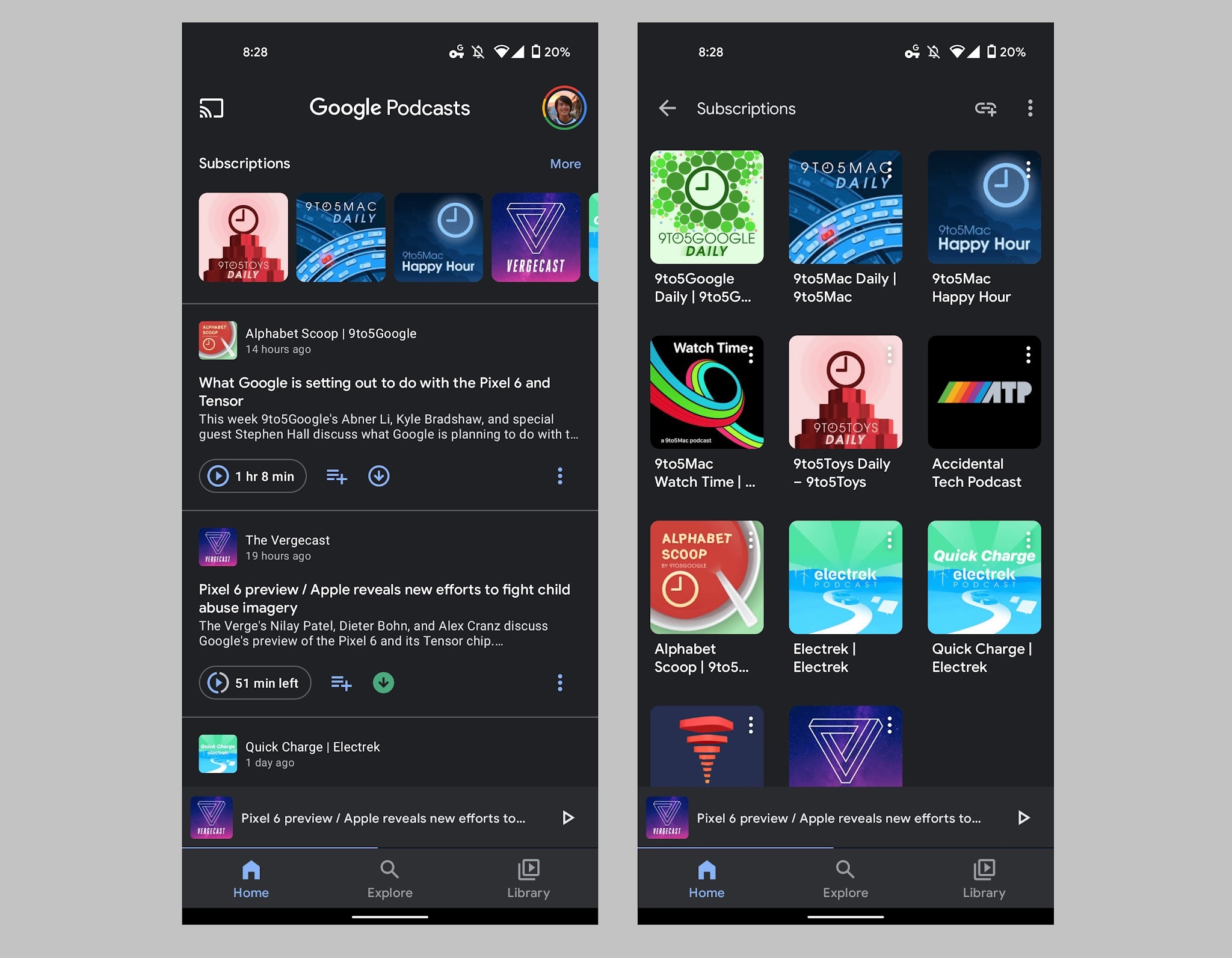
Google Podcast (formerly Google Play Podcast) is Google’s proprietary podcast-listening app. It comes pre-installed on some Android smartphones and all Pixel editions. Even Apple users can install Google Podcasts via the App Store. It’s free and lets you discover, stream, and download podcasts.
Google Podcast has already hit 100 million downloads, an indication of its rising popularity both among content creators and users. Users prefer it for its navigable, search-aligned, minimalist interface. And prominent podcast creators are focusing on the app to make their episodes accessible to millions of Android users.
Part 2: Google Podcasts Features
Compatible with Android, iOS, macOS, Windows, Blackberry, and ChromeOS, Google Podcast is relatively a novice compared to dedicated podcast services. Still, Google Podcast seamlessly incorporates nearly every feature one needs to listen to podcasts.
Search and Personalized Recommendations
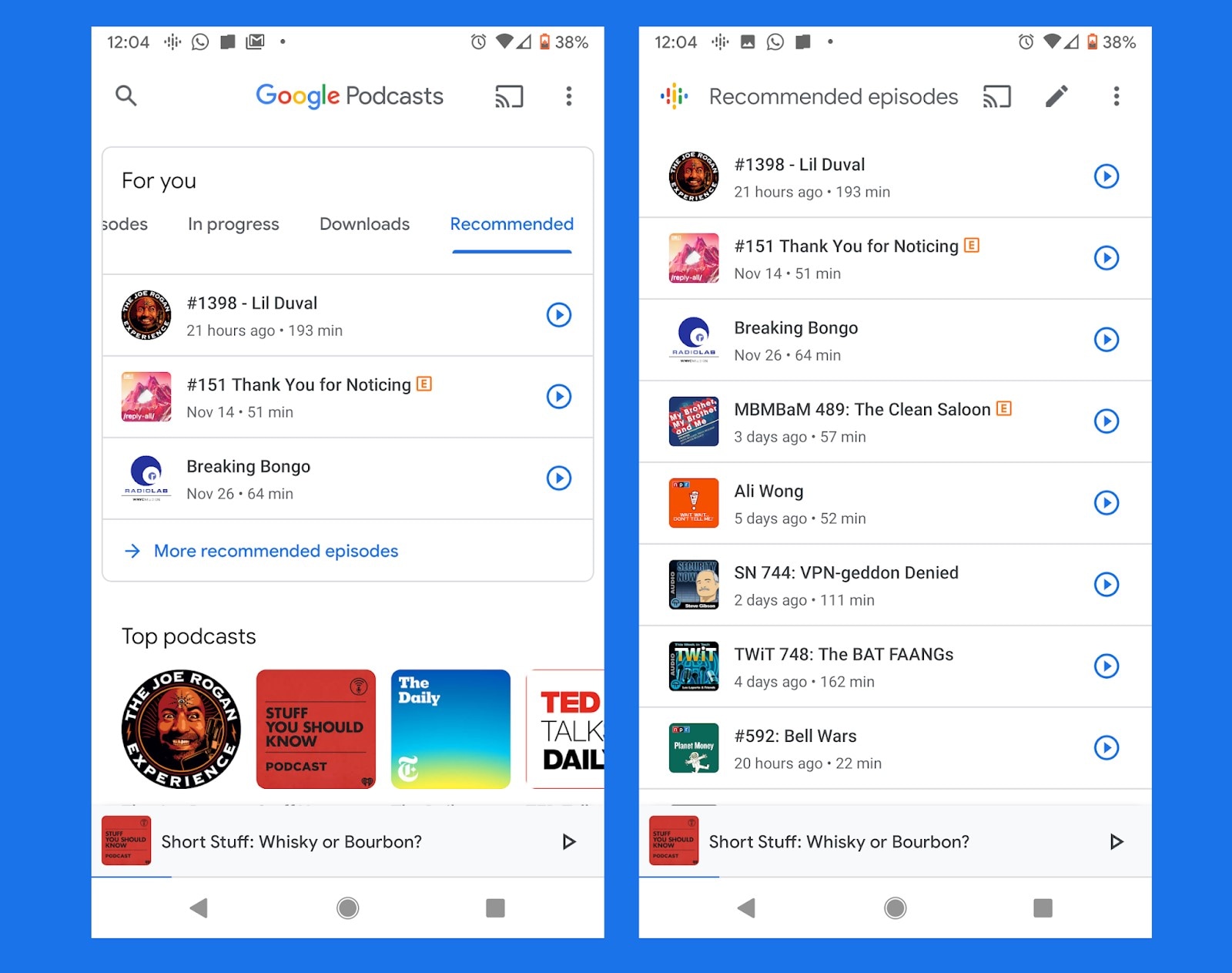
The most significant feature of Google Podcast is its algorithm-based recommendations that connect users with shows that suit their listening habits. As a new user, you might want to explore new topics and taste new concepts, and that’s where Google Podcast will impress you. But even more than that, it will automatically recommend suitable podcasts depending on your interest and previous engagements with the platform.
Google Podcast app covers a plethora of podcasts, so you do not have to switch to other platforms to discover something new or topics you love.
Free and Ad-free Experience
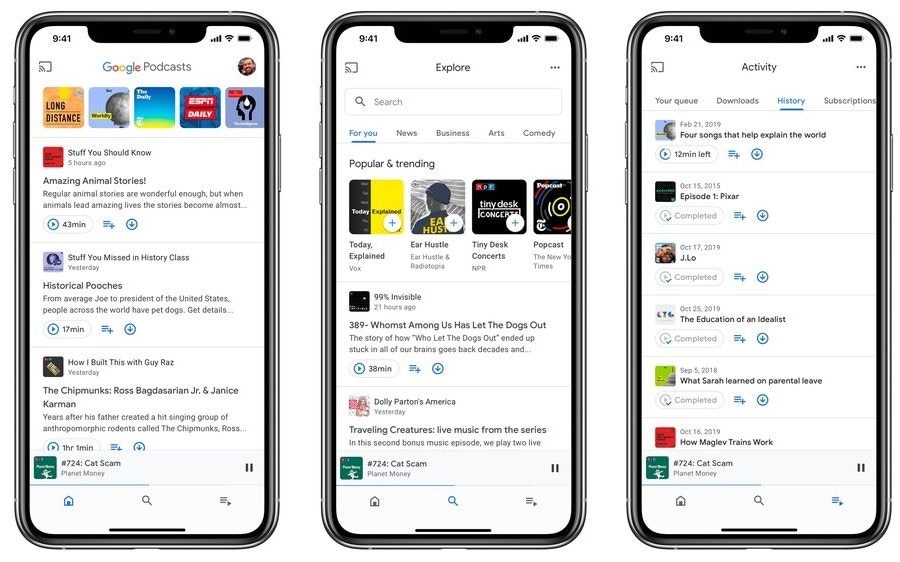
Google Podcast is completely free in a world where podcast platforms demand high charges for an ad-free and high-quality experience. All you need is a Google account to register and listen to anything available on the platform. In addition, podcast creators have to qualify to Google’s standards before submitting the podcast on the forum, ensuring you will listen to the podcast in high quality.
Clean UI
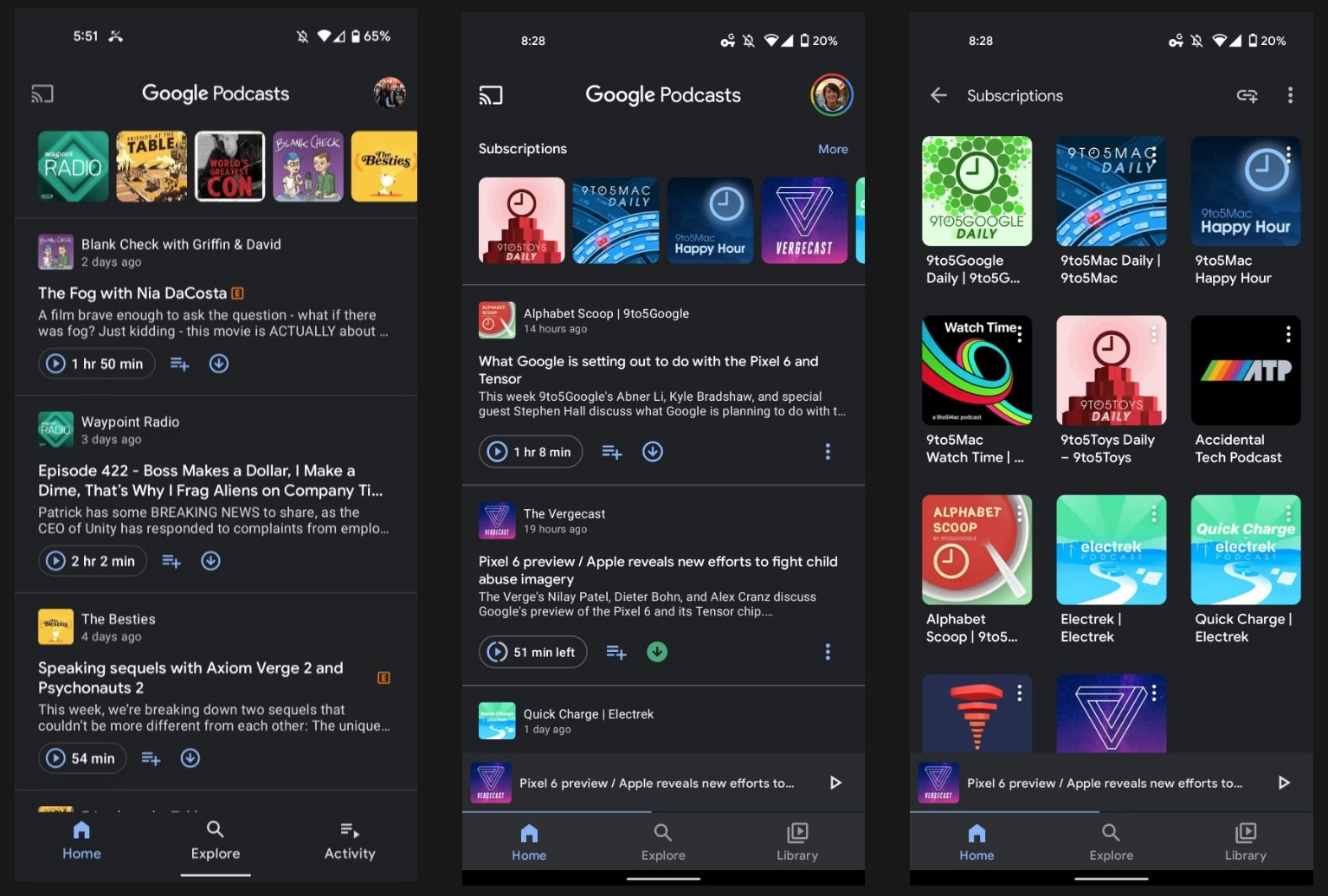
Whether you’ve used a podcast platform before or not, the Google Podcast platform will seem familiar. Once you sign up, the interface will welcome you with podcasts covering all genres arranged neatly in a grid view for convenience.
In line with simplicity, the Settings option in the Google Platform app is as basic as basic gets. Plus, it allows you to conveniently organize your subscriptions and downloads via the Library tab.
One more thing: although Google Podcast is primarily designed for Android users, its counterparts on other OS, like Apple, Web, and macOS, remain simple and easy to use.
Auto-downloads, Sleep Timer, and Seamless Switch Between Devices
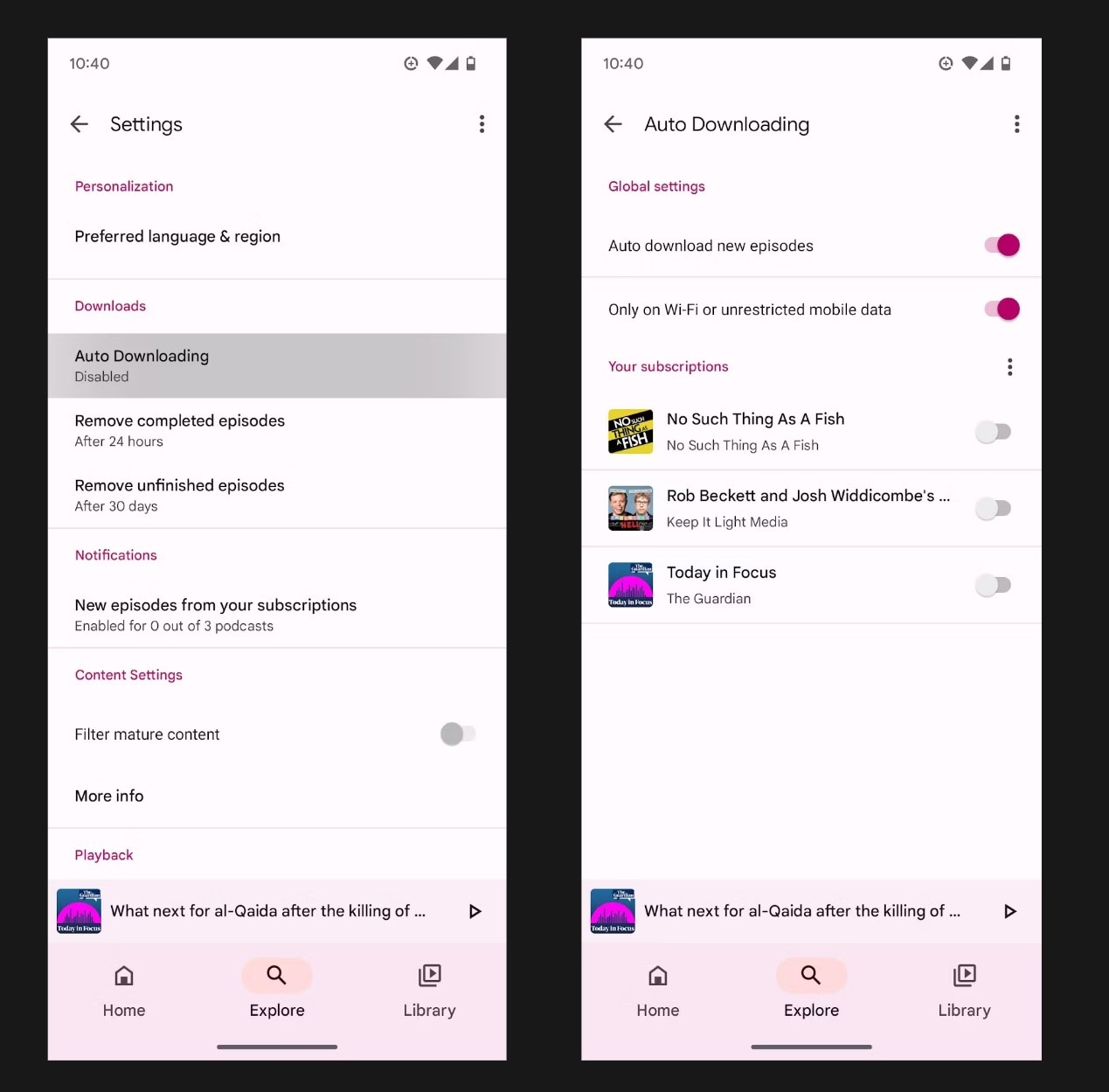
Google Podcast automatically downloads the podcasts you love and removes them after you’ve listened to the particular episodes.
Another significant characteristic of the Google Podcast platform is its intuitiveness. For instance, many podcast platforms do not automatically switch to the next episode, but you do not have to worry about such aspects with Google Podcast. You can also put a sleep timer.
Given that it’s available on all primary OS, you can seamlessly switch from one device to another. Not to forget, you can search for the podcasts using Google search or your Voice Assitant.
Part 3: How Does Google Podcast Work?
Now that you know the Google Podcast app and its features, here’s how to use the platform. Assuming you have downloaded the Google Podcast platform on your device and signed in using your Google account, we will now show you how to search and start listening to podcasts on the platform:
Step1 Add Your Favorites
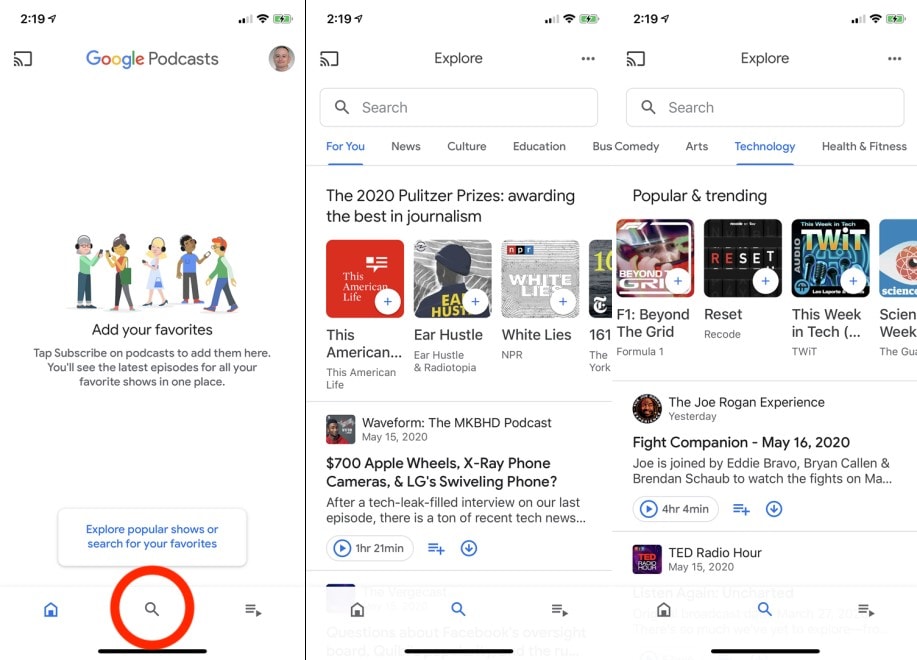
Once you register on the Google Podcast platform, the app will ask you to explore popular shows or search for your favorites. Once you click on the Explore option, a new screen with categories listed will be shown in the top menu, like For You, News, Culture, Education, Comedy, Technology, and more. Tap on the categories to view the features of podcasts in each category.
Step2 Search Podcasts Manually
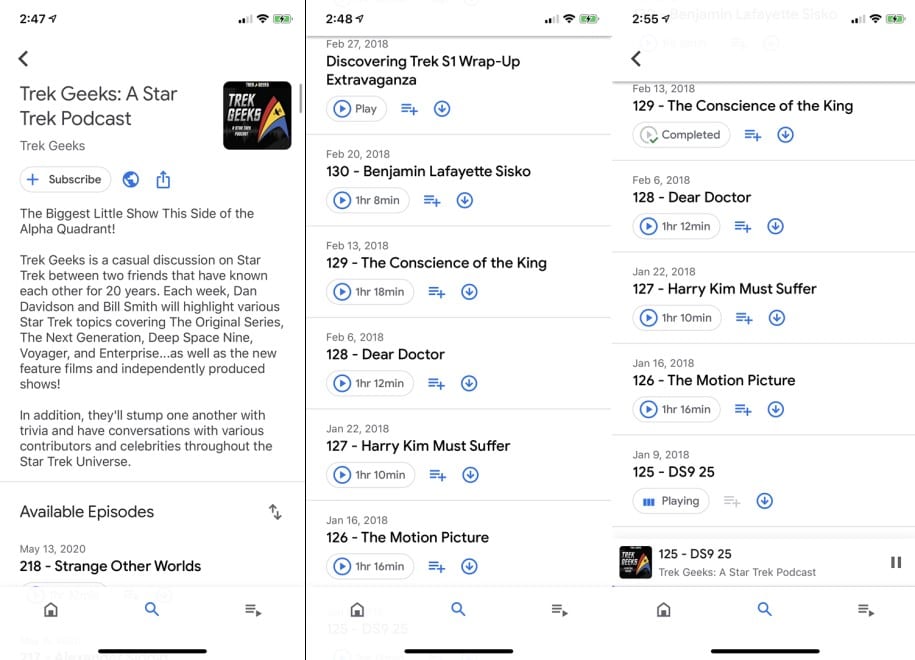
Click on the Search icon and then start typing the name of the podcasts you follow to locate them quickly. Next, tap on the desired podcasts from the search results and scroll down to view individual episodes. Finally, you can click the Subscribe button to follow the channel. The Play icon allows you to listen to the episodes.
Step3 Controls in the Google Podcast app
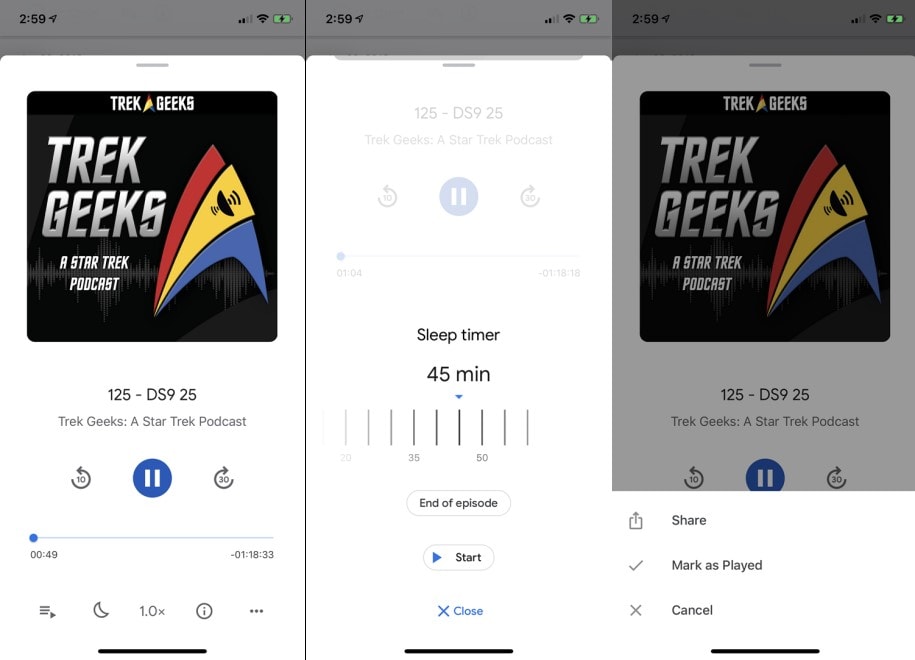
Once you play an episode on the Google Podcast platform, you will be taken to full-view mode. The Pause icon allows you to interrupt the episode. Plus, the 10 seconds rewind button allows you to go back and listen to something again.
Whereas the 30 seconds forward button will enable you to jump 30 seconds ahead in the episode, you can use this icon during the introduction or in-episode ads. The Speed icon lets you change the playback speed from 0.5x to 3x.
The “half-moon” icon allows you to set a sleep timer. And the “Info.” icon allows you to read about the individual podcasts (if published by the creators). The “ellipsis” icon (three dots) enables you to mark the episode as played, so it will not recommend the particular episode again. And the share button allows you to share the episode with others.
Step4 Queues and Downloads menu in the Google Podcast App
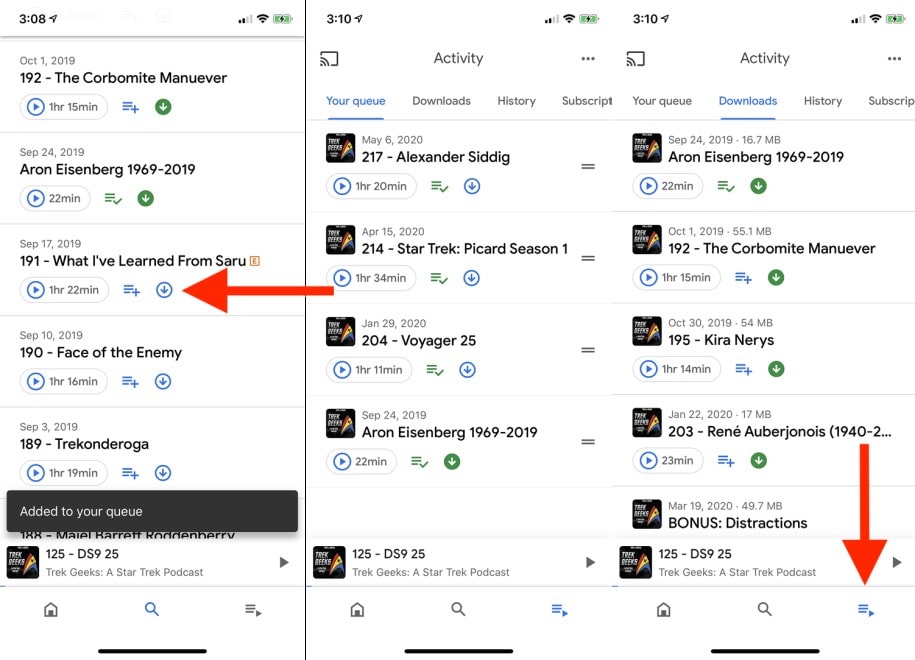
Given that the Google Podcast is a free platform, you can download all the episodes and listen to them offline. To download the episodes, click on the Download button. Once downloaded, you can access them via the three-lined icon from the bottom-right of the interface. Within the Library tab, you will also find the History tab, which allows you to access all the episodes you’ve previously listened to.
Step5 Settings in the Google Podcast platform
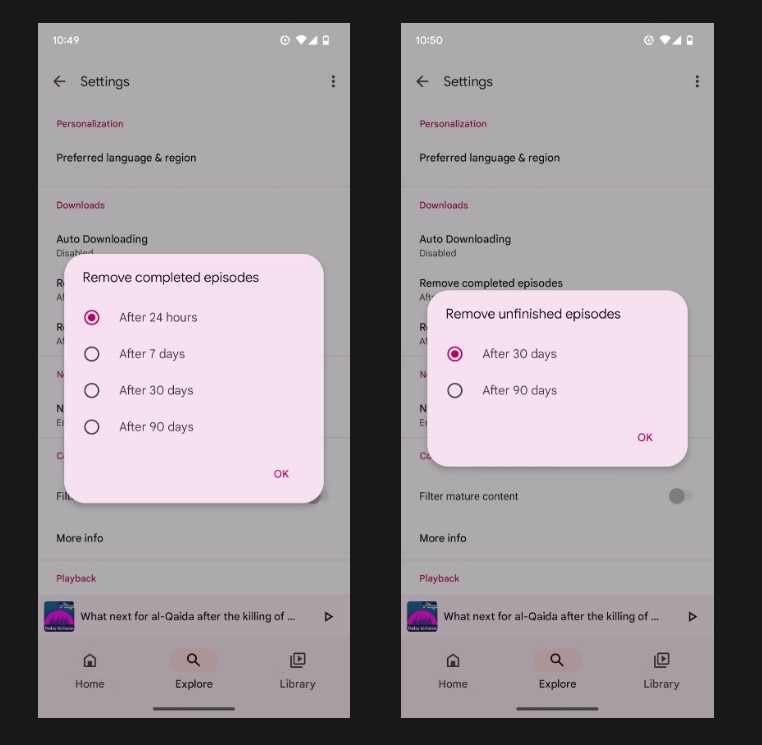
Click on your image at the top-right corner to access the Settings in the Google Podcast app. Under the Google Podcast Settings page, you will find options for Downloads, Notifications, Playback, and more. For instance, Auto-downloads allow you to control the quality of the downloads and when to download (like over mobile data or Wi-Fi).
Plus, you can choose when to auto-delete the episodes, like after a week, and so on. Other options like Playback allow you to decide whether to Auto-play the next episode or not.
Video Tutorial of the Google Podcast App
Here’s a video tutorial 6 Months Later Review Channel: How to Use the New Google Podcasts (2020)
In the video, Josh Teder familiarizes you with Settings, Browse, Library, Subscriptions, and other features of the Google Podcast platform.
Part 4: 10 Popular & Trending Podcasts on Google Podcast App
Now that you have a complete idea about the Google Podcast app, here are some of the best podcasts featured on the platform. Of course, given the popularity of podcasts, the choices are endless. But it is vital to retain that with great options comes great mediocrity.
That is why we asked all our team members to contribute and came up with this short list of best podcasts on the Google Podcast app that covers all genres. So, whether your interests lie in tech, true crime, pop culture, or comedy, you will find something that educates and entertains you.
1. Best Podcast on Art & Culture
Host: Jennifer Dasal
Number of Episodes on ArtCurious: More than 100.
Episodes Duration: 15-25 minutes
Upload Frequency: Weekly

Discussing the unexpected, the slightly odd, and the strangely wonderful in Art History, ArtCurious is nothing like an art class where terminologies are thrown and linear perspective is discussed. Instead, it discusses the juicy stuff!
On ArtCurious, you will find hidden truths about famous artists and creators, like why Van Gogh committed suicide. In addition, you will learn about the strange habits of revolutionary artists. If you are an art enthusiast and want to explore the unseen corners of art history, ArtCurious will fill your thirst.
2. Best Tech Podcasts
Host: Dan Moren and Mikah Sargent + 2 Guests (every week)
Number of Episodes on Clockwise: More than 400.
Episode duration: 30 minutes
Upload Frequency: Weekly

Dan Moren and Mikah Sargent invite two guests each week to discuss tech-related topics to inform, educate, and make aware of the not-so-tech generation. If you struggle with technology, like creating a good password, optimizing screen time, etc. Also, Clockwise is one podcast that can be the cure. It is important to note that Clockwise does not necessarily discuss heavy-tech stuff; instead, it is intended for the tech illiterates to make their life easier.
3. Best Talkshow and Interview Podcasts
Host: Terry Gross
Number of Episodes on Fresh Air: Daily since 1993.
Episodes duration: 45 minutes
Upload Frequency: Daily

Terry Gross, a famed-journalists and talk show host since the 90s, continues to feature weekly episodes covering present-day musicians, actors, producers, athletes, and artists.
On Fresh Air, you will discover exciting stuff about celebrities and find answers like how fame is a challenge in the social sphere and many more unusual things that you won’t find on any other talk show. Terry Gross interviews a single guest for about 45 minutes daily and indulges audiences with what’s happening worldwide.
4. Best Health Podcast
Host: Andrew Huberman
Number of Episodes on Fresh Air: More than 100.
Episode duration: 2 hours to 4 hours.
Upload Frequency: Weekly

Andrew Huberman, Professor of Neurobiology and Ophthalmology at Stanford School of Medicine, discusses the brain and its connection with body control. The episodes of Huberman Lab are long, ranging from 2 to 4 hours. So, if you want to change your habits and learn about nutrition, how to sleep, and more, Huberman Lab is the perfect addition to your Monday schedule.
5. Best History Podcast
The Bowery Boys New York City History
Host: Tom Meyers, Greg Young
Number of Episodes on Fresh Air: More than 400.
Episode duration: 1 to 2 hours.
Upload Frequency: 15 days.

American history is deeply rooted in the streets of New York City. The Underground Railroad, the elevated railroad, and the Hudson River: Host Tom Meyers and Greg Young discuss the 400 years of History of New York City. It discusses the famous leaders, the strange, and the myths created over the years and presents these stories via action-packed episodes.
6. Best Informative Podcast
Host: Stephen J. Dubner
Number of Episodes on Fresh Air: More than 500.
Episode duration: 30 to 60 minutes.
Upload Frequency: Weekly

Hosted by Dr. Stephen J. Dubner, Freakonomics Radio reveals the hidden sides of things. The things you think you know or you think you do not have to know, Freakonomics Radio will introduce topics that are typical for you and tell interesting stuff that amazes you.
It also informs you about things you might ignore and makes you more aware of everything. The best thing is Dubner invites Nobel laureates and provocateurs, intellectuals and entrepreneurs, and even underachievers to learn about things from all perspectives.
7. Best News & Politics Podcast
Host: Nate Silver
Number of Episodes on Fresh Air: More than 500.
Episode duration: 30 to 60 minutes.
Upload Frequency: Weekly

A subsidiary of ABC News, FiveThirtyEight Politics uses data and evidence-based knowledge to inform, educate, and make people aware of the current political situation across the 50 States. It’s suitable for anyone interested in knowing the truth of today’s American politics and the difference between the real truth and the created truth.
8. Best Sports Podcasts
Host: Bill Simmons
Number of Episodes on Fresh Air: More than 100.
Episode duration: 30 to 60 minutes.
Upload Frequency: Monthly
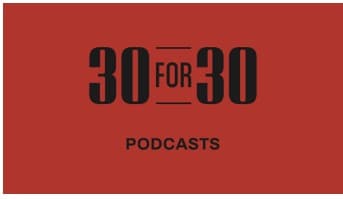
30 for 30 comes from the acclaimed makers of the 30-for-30 film series. Like documentaries, the 30 for 30 podcasts discuss sports legends, their stories, and unheard things about them. Beyond being informative, 30 for 30 also teaches you to explore sports and adventures. Even if you do not like sports or are not a football fan, you will surely enjoy tuning in to 30 for 30 episodes and getting lost in the busy lives of the sports legends.
9. Miscellaneous Podcasts
Host: Dan Schreiber, James Harkin, Andrew Hunter Murray, and Anna Ptaszynski.
Number of Episodes on Fresh Air: More than 400.
Episode duration: 1 hour.
Upload Frequency: Weekly

An award-winning podcast, No Such Thing As a Fish, comes from QI Offices and is about fun topics or something the creators have recently discovered. If you are looking for something fun yet interesting that informs and educates you, No Such Thing As a Fish is a perfect weekly podcast. The episodes are brief yet action-packed. And you will learn just about anything, from gorillas to caterpillars, on the podcast.
10. Movies, Music, and TV Podcasts
Host: Eric Molinsky
Number of Episodes on Fresh Air: More than 400.
Episode duration: 40 minutes.
Upload Frequency: Bi-weekly.

A podcast on science fiction, fantasy, and other genres, Eric Molinsky on Imaginary Worlds invite comic book artists, game designers, novelists, screenwriters, and filmmakers to discuss their crafts. Imaginary Worlds is just about what it sounds like, i.e., creating fictional worlds.
However, instead of just informing, it also guides artists and writers on how to form an imaginary world. A bi-weekly podcast, Imaginary Worlds is perfect for anyone interested in exploring new possibilities and imagining via different lenses.
Part 5: How to Record Your Podcast Show for Google Podcast App?
Google Podcast platform also allows individual creators to upload their podcasts to the platform and share it with the world. Given its popularity and user base, it’s one of the best ways to rise in the podcast realm and get that edge over others.
So, if you are interested in creating podcasts, here’s how to get started. For recording a podcast, you will have to use a third-party tool like Wondershare Filmora. Unlike Apple Podcasts, Google Podcasts does not provide a web studio to create a podcast on the platform.
Google Podcast is a podcasting directory; it does not store any audio files. Instead:
- It would help if you created the podcast somewhere else, like using Wondershare Filmora for recording.
- Upload it or store it in another location, like a Website. Or you can create a podcast-only RSS feed.
- And then submit the RSS feed to the Google Podcast Manager.
So, let’s first learn how to record podcasts using Wondershare Filmora.
Free Download For Win 7 or later(64-bit)
Free Download For macOS 10.14 or later
Wondershare’s Filmora is one of the best platforms to seamlessly record audio and video podcasts. Its straightforward and self-explanatory user interface allows even novices to record podcasts without going through any learning curve.
Besides recording, Filmora also allows you to edit audio and video. For instance, you will find dedicated toggles to limit background interferences, enhance microphone sound, fade in/out effects, and give access to several such features to create podcasts like a professional. You can also export the audio in the format that Google Podcast requires, like M4A, MP3, OGG, and WAV.
Key Features of Wondershare Filmora
- AI-based Silence Detection: remove moments of silence from the podcast with one click.
- Text to speech: transcript your text files into speech for the podcast.
- Speech to Text: transcribe their voice to subtitles in several languages. It increases accessibility, and users worldwide can understand your podcast seamlessly.
- Audio Ducking: Add background music to your podcast and manage the sound levels to create podcasts like professionals.
- Audio Visualizer: enhance your podcast episodes through audio-visualizing effects.
Here’s How to Create Your Own Podcast Using Wondershare Filmora?
Step1 Create a New Project
- Download the Filmora application.
- Choose to Create a New Project from the main interface.
- Import an image or stock footage from the library. (You can later download the podcast in audio format).
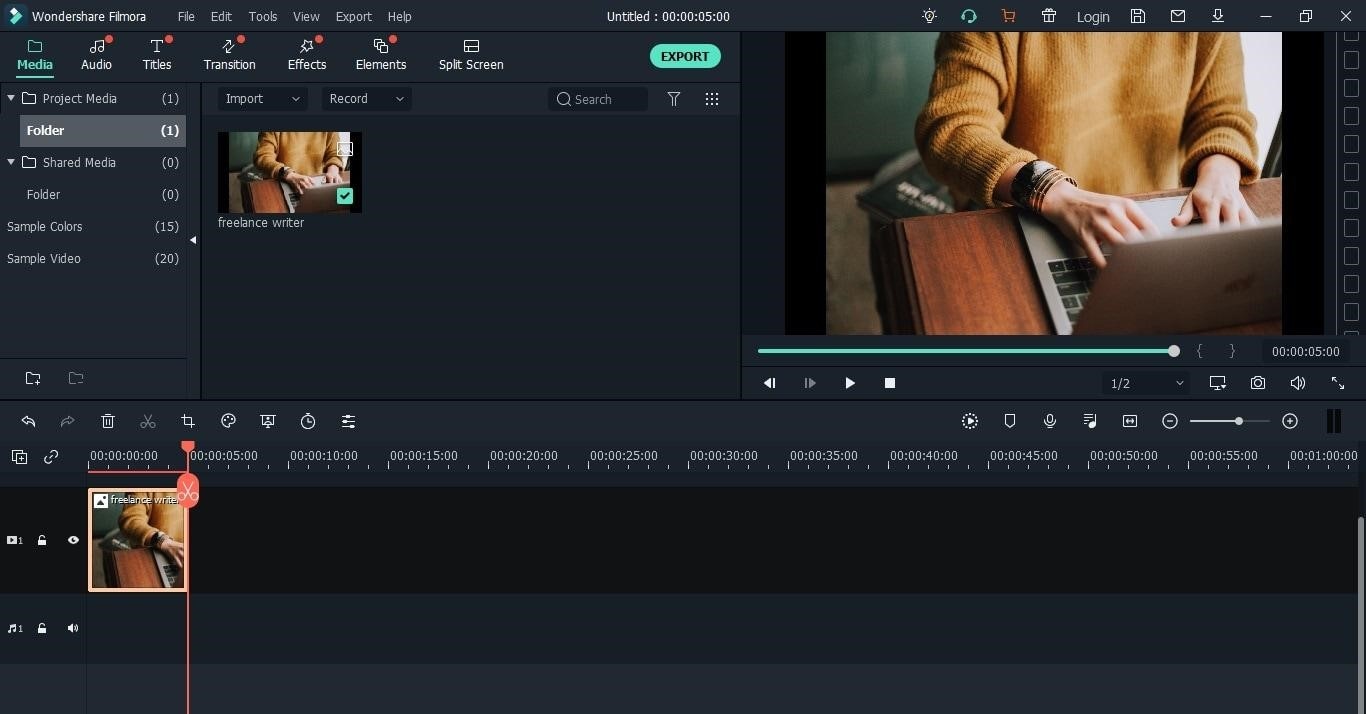
Step2 Start Recording
- Drag the media into the timeline and click the Record button to start recording.
- Click on Record Voiceover from the options.
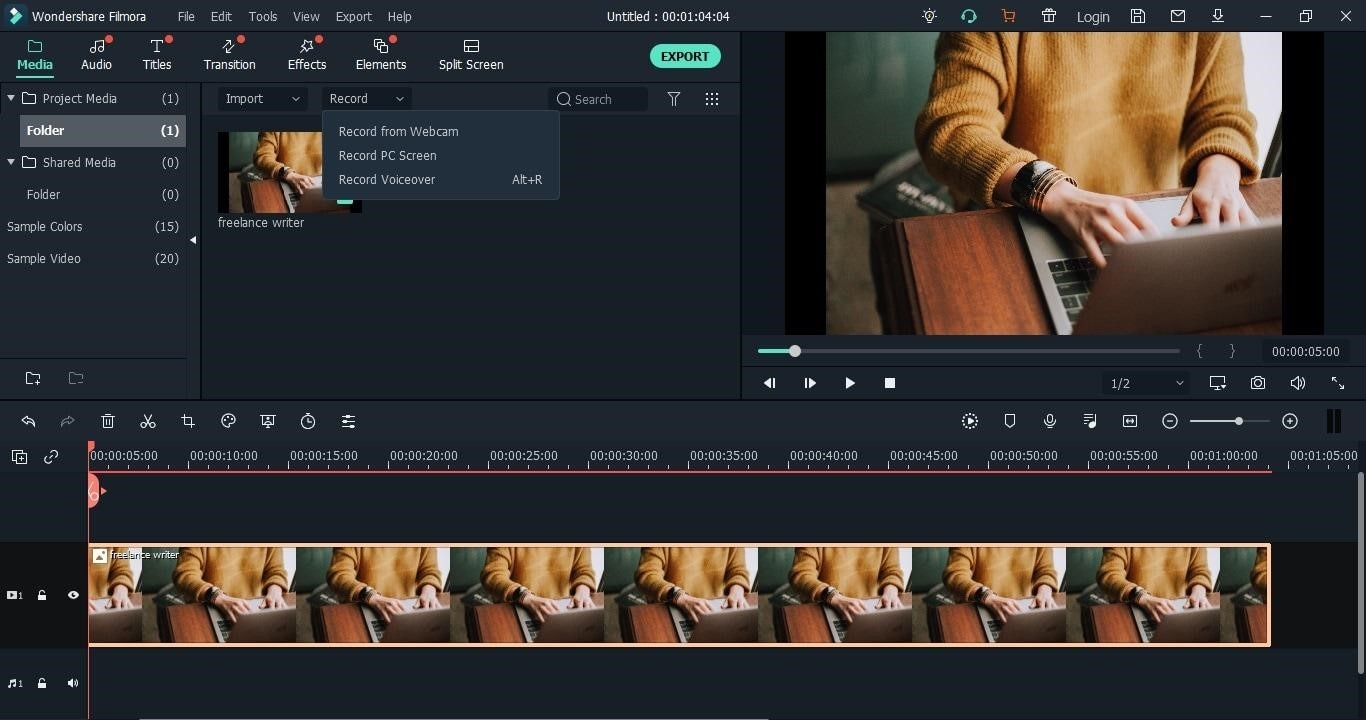
Step3 Set Microphone
- Connect your Microphone to the computer.
- Select the Microphone device.
- And click on the Red dot button to confirm the Voiceover recording.
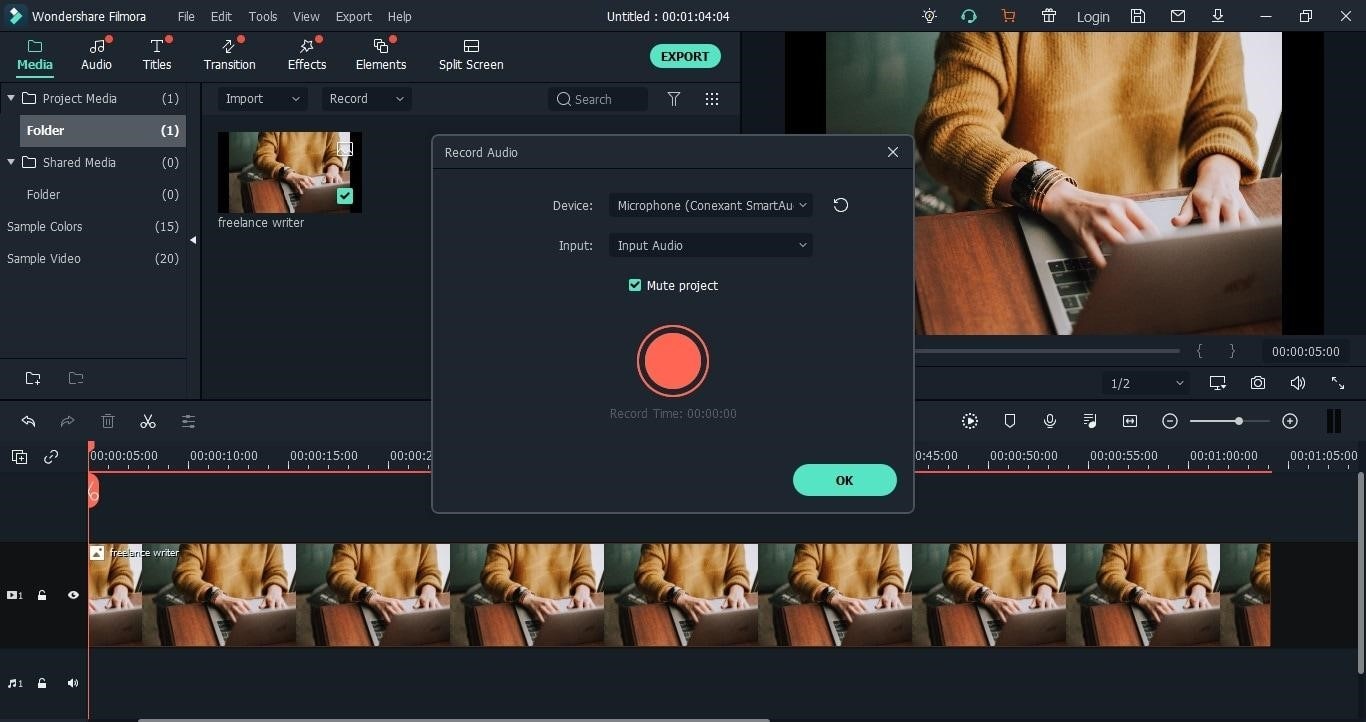
Step4 Record the Podcast
- Click on OK to proceed to record the podcast.
- Go through the outline you’ve prepared and discuss the topics for the podcast episode.
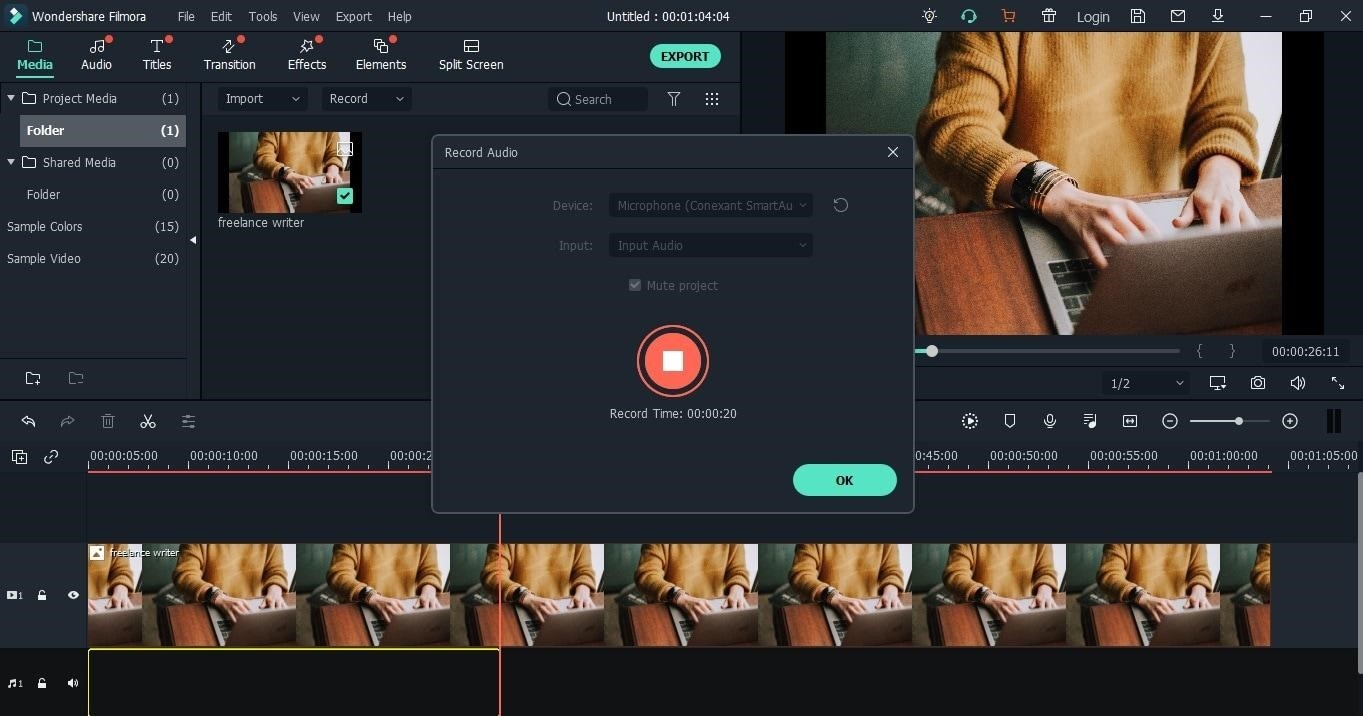
Step5 Export audio
Click on the Export button to download your project from Wondershare Filmora.
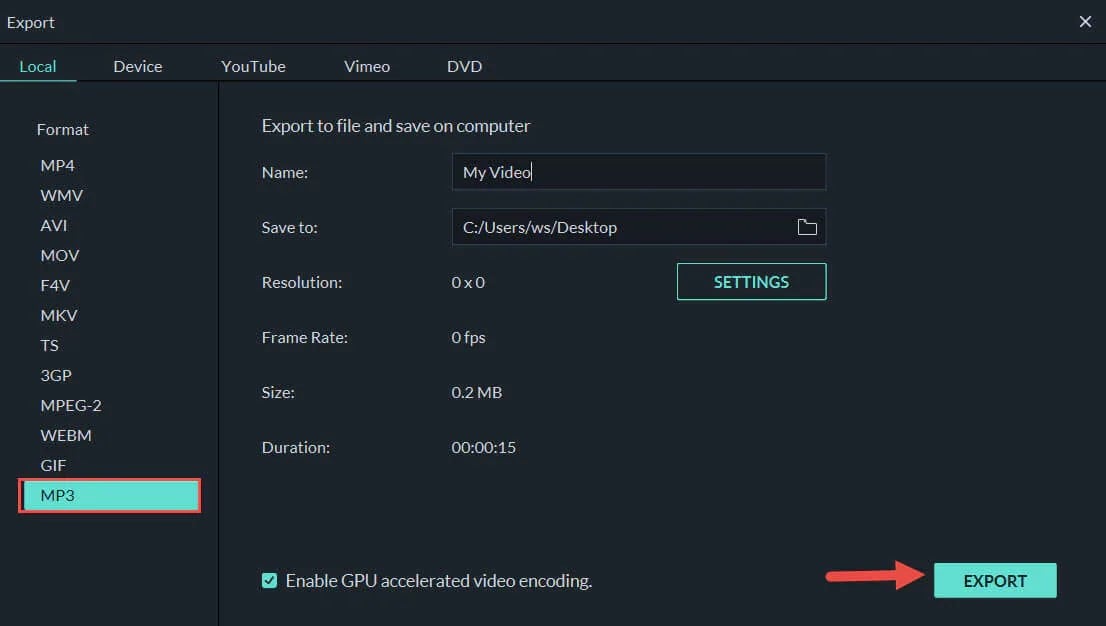
Now that you’ve recorded the podcast episode, you must create your podcast’s RSS feed. And submit the podcast RSS feed to Google Podcast Manager.
Hot FAQs on the Google Podcast App
1. Is Google Play the same as Google Podcast?
Earlier, Google featured podcasts on the Google Play platform (hence the name, Google Play Podcast). However, today Google Play does not feature any podcasts. So, you will have to choose Google Podcast
2. Where did Google Music Podcasts go?
Google shut down Google Music on February 24, 2021. However, it allowed users to move their podcasts and music files from Google Music to YouTube before that date. So, there’s a good chance you can find the earlier podcasts available on Google Music on YouTube.
3. Is Google Podcasts Ad-free?
Yes. Google Podcast app is entirely ad-free, and there is no subscription either. So you might see in-episode promotions that individual creators present, but there are no ads in the Google Podcast app.
Final Words
Hopefully, you now know the Google Podcast app and what you will find on the Google Podcast platform. As promised, we have also shown you how to use the Google Podcast app. Retain that you can use the Google Podcast app on all primary OS, including Apple and Android devices. The podcast recommendations in this guide are written to inform users about the great shows that resonate with them.
Another significant aspect of this guide on the Google Podcast app is creating your podcast and submitting it to the platform. Google Podcast, a directory, requires you to create your own podcast and submit the podcasts via RSS feeds. So, even if you want to make your podcast, you can use tools like Filmora and then publish it on Google Podcast to share it with the world.
Part 1. What is Google Podcast App?

Google Podcast (formerly Google Play Podcast) is Google’s proprietary podcast-listening app. It comes pre-installed on some Android smartphones and all Pixel editions. Even Apple users can install Google Podcasts via the App Store. It’s free and lets you discover, stream, and download podcasts.
Google Podcast has already hit 100 million downloads, an indication of its rising popularity both among content creators and users. Users prefer it for its navigable, search-aligned, minimalist interface. And prominent podcast creators are focusing on the app to make their episodes accessible to millions of Android users.
Part 2: Google Podcasts Features
Compatible with Android, iOS, macOS, Windows, Blackberry, and ChromeOS, Google Podcast is relatively a novice compared to dedicated podcast services. Still, Google Podcast seamlessly incorporates nearly every feature one needs to listen to podcasts.
Search and Personalized Recommendations

The most significant feature of Google Podcast is its algorithm-based recommendations that connect users with shows that suit their listening habits. As a new user, you might want to explore new topics and taste new concepts, and that’s where Google Podcast will impress you. But even more than that, it will automatically recommend suitable podcasts depending on your interest and previous engagements with the platform.
Google Podcast app covers a plethora of podcasts, so you do not have to switch to other platforms to discover something new or topics you love.
Free and Ad-free Experience

Google Podcast is completely free in a world where podcast platforms demand high charges for an ad-free and high-quality experience. All you need is a Google account to register and listen to anything available on the platform. In addition, podcast creators have to qualify to Google’s standards before submitting the podcast on the forum, ensuring you will listen to the podcast in high quality.
Clean UI

Whether you’ve used a podcast platform before or not, the Google Podcast platform will seem familiar. Once you sign up, the interface will welcome you with podcasts covering all genres arranged neatly in a grid view for convenience.
In line with simplicity, the Settings option in the Google Platform app is as basic as basic gets. Plus, it allows you to conveniently organize your subscriptions and downloads via the Library tab.
One more thing: although Google Podcast is primarily designed for Android users, its counterparts on other OS, like Apple, Web, and macOS, remain simple and easy to use.
Auto-downloads, Sleep Timer, and Seamless Switch Between Devices

Google Podcast automatically downloads the podcasts you love and removes them after you’ve listened to the particular episodes.
Another significant characteristic of the Google Podcast platform is its intuitiveness. For instance, many podcast platforms do not automatically switch to the next episode, but you do not have to worry about such aspects with Google Podcast. You can also put a sleep timer.
Given that it’s available on all primary OS, you can seamlessly switch from one device to another. Not to forget, you can search for the podcasts using Google search or your Voice Assitant.
Part 3: How Does Google Podcast Work?
Now that you know the Google Podcast app and its features, here’s how to use the platform. Assuming you have downloaded the Google Podcast platform on your device and signed in using your Google account, we will now show you how to search and start listening to podcasts on the platform:
Step1 Add Your Favorites

Once you register on the Google Podcast platform, the app will ask you to explore popular shows or search for your favorites. Once you click on the Explore option, a new screen with categories listed will be shown in the top menu, like For You, News, Culture, Education, Comedy, Technology, and more. Tap on the categories to view the features of podcasts in each category.
Step2 Search Podcasts Manually

Click on the Search icon and then start typing the name of the podcasts you follow to locate them quickly. Next, tap on the desired podcasts from the search results and scroll down to view individual episodes. Finally, you can click the Subscribe button to follow the channel. The Play icon allows you to listen to the episodes.
Step3 Controls in the Google Podcast app

Once you play an episode on the Google Podcast platform, you will be taken to full-view mode. The Pause icon allows you to interrupt the episode. Plus, the 10 seconds rewind button allows you to go back and listen to something again.
Whereas the 30 seconds forward button will enable you to jump 30 seconds ahead in the episode, you can use this icon during the introduction or in-episode ads. The Speed icon lets you change the playback speed from 0.5x to 3x.
The “half-moon” icon allows you to set a sleep timer. And the “Info.” icon allows you to read about the individual podcasts (if published by the creators). The “ellipsis” icon (three dots) enables you to mark the episode as played, so it will not recommend the particular episode again. And the share button allows you to share the episode with others.
Step4 Queues and Downloads menu in the Google Podcast App

Given that the Google Podcast is a free platform, you can download all the episodes and listen to them offline. To download the episodes, click on the Download button. Once downloaded, you can access them via the three-lined icon from the bottom-right of the interface. Within the Library tab, you will also find the History tab, which allows you to access all the episodes you’ve previously listened to.
Step5 Settings in the Google Podcast platform

Click on your image at the top-right corner to access the Settings in the Google Podcast app. Under the Google Podcast Settings page, you will find options for Downloads, Notifications, Playback, and more. For instance, Auto-downloads allow you to control the quality of the downloads and when to download (like over mobile data or Wi-Fi).
Plus, you can choose when to auto-delete the episodes, like after a week, and so on. Other options like Playback allow you to decide whether to Auto-play the next episode or not.
Video Tutorial of the Google Podcast App
Here’s a video tutorial 6 Months Later Review Channel: How to Use the New Google Podcasts (2020)
In the video, Josh Teder familiarizes you with Settings, Browse, Library, Subscriptions, and other features of the Google Podcast platform.
Part 4: 10 Popular & Trending Podcasts on Google Podcast App
Now that you have a complete idea about the Google Podcast app, here are some of the best podcasts featured on the platform. Of course, given the popularity of podcasts, the choices are endless. But it is vital to retain that with great options comes great mediocrity.
That is why we asked all our team members to contribute and came up with this short list of best podcasts on the Google Podcast app that covers all genres. So, whether your interests lie in tech, true crime, pop culture, or comedy, you will find something that educates and entertains you.
1. Best Podcast on Art & Culture
Host: Jennifer Dasal
Number of Episodes on ArtCurious: More than 100.
Episodes Duration: 15-25 minutes
Upload Frequency: Weekly

Discussing the unexpected, the slightly odd, and the strangely wonderful in Art History, ArtCurious is nothing like an art class where terminologies are thrown and linear perspective is discussed. Instead, it discusses the juicy stuff!
On ArtCurious, you will find hidden truths about famous artists and creators, like why Van Gogh committed suicide. In addition, you will learn about the strange habits of revolutionary artists. If you are an art enthusiast and want to explore the unseen corners of art history, ArtCurious will fill your thirst.
2. Best Tech Podcasts
Host: Dan Moren and Mikah Sargent + 2 Guests (every week)
Number of Episodes on Clockwise: More than 400.
Episode duration: 30 minutes
Upload Frequency: Weekly

Dan Moren and Mikah Sargent invite two guests each week to discuss tech-related topics to inform, educate, and make aware of the not-so-tech generation. If you struggle with technology, like creating a good password, optimizing screen time, etc. Also, Clockwise is one podcast that can be the cure. It is important to note that Clockwise does not necessarily discuss heavy-tech stuff; instead, it is intended for the tech illiterates to make their life easier.
3. Best Talkshow and Interview Podcasts
Host: Terry Gross
Number of Episodes on Fresh Air: Daily since 1993.
Episodes duration: 45 minutes
Upload Frequency: Daily

Terry Gross, a famed-journalists and talk show host since the 90s, continues to feature weekly episodes covering present-day musicians, actors, producers, athletes, and artists.
On Fresh Air, you will discover exciting stuff about celebrities and find answers like how fame is a challenge in the social sphere and many more unusual things that you won’t find on any other talk show. Terry Gross interviews a single guest for about 45 minutes daily and indulges audiences with what’s happening worldwide.
4. Best Health Podcast
Host: Andrew Huberman
Number of Episodes on Fresh Air: More than 100.
Episode duration: 2 hours to 4 hours.
Upload Frequency: Weekly

Andrew Huberman, Professor of Neurobiology and Ophthalmology at Stanford School of Medicine, discusses the brain and its connection with body control. The episodes of Huberman Lab are long, ranging from 2 to 4 hours. So, if you want to change your habits and learn about nutrition, how to sleep, and more, Huberman Lab is the perfect addition to your Monday schedule.
5. Best History Podcast
The Bowery Boys New York City History
Host: Tom Meyers, Greg Young
Number of Episodes on Fresh Air: More than 400.
Episode duration: 1 to 2 hours.
Upload Frequency: 15 days.

American history is deeply rooted in the streets of New York City. The Underground Railroad, the elevated railroad, and the Hudson River: Host Tom Meyers and Greg Young discuss the 400 years of History of New York City. It discusses the famous leaders, the strange, and the myths created over the years and presents these stories via action-packed episodes.
6. Best Informative Podcast
Host: Stephen J. Dubner
Number of Episodes on Fresh Air: More than 500.
Episode duration: 30 to 60 minutes.
Upload Frequency: Weekly

Hosted by Dr. Stephen J. Dubner, Freakonomics Radio reveals the hidden sides of things. The things you think you know or you think you do not have to know, Freakonomics Radio will introduce topics that are typical for you and tell interesting stuff that amazes you.
It also informs you about things you might ignore and makes you more aware of everything. The best thing is Dubner invites Nobel laureates and provocateurs, intellectuals and entrepreneurs, and even underachievers to learn about things from all perspectives.
7. Best News & Politics Podcast
Host: Nate Silver
Number of Episodes on Fresh Air: More than 500.
Episode duration: 30 to 60 minutes.
Upload Frequency: Weekly

A subsidiary of ABC News, FiveThirtyEight Politics uses data and evidence-based knowledge to inform, educate, and make people aware of the current political situation across the 50 States. It’s suitable for anyone interested in knowing the truth of today’s American politics and the difference between the real truth and the created truth.
8. Best Sports Podcasts
Host: Bill Simmons
Number of Episodes on Fresh Air: More than 100.
Episode duration: 30 to 60 minutes.
Upload Frequency: Monthly

30 for 30 comes from the acclaimed makers of the 30-for-30 film series. Like documentaries, the 30 for 30 podcasts discuss sports legends, their stories, and unheard things about them. Beyond being informative, 30 for 30 also teaches you to explore sports and adventures. Even if you do not like sports or are not a football fan, you will surely enjoy tuning in to 30 for 30 episodes and getting lost in the busy lives of the sports legends.
9. Miscellaneous Podcasts
Host: Dan Schreiber, James Harkin, Andrew Hunter Murray, and Anna Ptaszynski.
Number of Episodes on Fresh Air: More than 400.
Episode duration: 1 hour.
Upload Frequency: Weekly

An award-winning podcast, No Such Thing As a Fish, comes from QI Offices and is about fun topics or something the creators have recently discovered. If you are looking for something fun yet interesting that informs and educates you, No Such Thing As a Fish is a perfect weekly podcast. The episodes are brief yet action-packed. And you will learn just about anything, from gorillas to caterpillars, on the podcast.
10. Movies, Music, and TV Podcasts
Host: Eric Molinsky
Number of Episodes on Fresh Air: More than 400.
Episode duration: 40 minutes.
Upload Frequency: Bi-weekly.

A podcast on science fiction, fantasy, and other genres, Eric Molinsky on Imaginary Worlds invite comic book artists, game designers, novelists, screenwriters, and filmmakers to discuss their crafts. Imaginary Worlds is just about what it sounds like, i.e., creating fictional worlds.
However, instead of just informing, it also guides artists and writers on how to form an imaginary world. A bi-weekly podcast, Imaginary Worlds is perfect for anyone interested in exploring new possibilities and imagining via different lenses.
Part 5: How to Record Your Podcast Show for Google Podcast App?
Google Podcast platform also allows individual creators to upload their podcasts to the platform and share it with the world. Given its popularity and user base, it’s one of the best ways to rise in the podcast realm and get that edge over others.
So, if you are interested in creating podcasts, here’s how to get started. For recording a podcast, you will have to use a third-party tool like Wondershare Filmora. Unlike Apple Podcasts, Google Podcasts does not provide a web studio to create a podcast on the platform.
Google Podcast is a podcasting directory; it does not store any audio files. Instead:
- It would help if you created the podcast somewhere else, like using Wondershare Filmora for recording.
- Upload it or store it in another location, like a Website. Or you can create a podcast-only RSS feed.
- And then submit the RSS feed to the Google Podcast Manager.
So, let’s first learn how to record podcasts using Wondershare Filmora.
Free Download For Win 7 or later(64-bit)
Free Download For macOS 10.14 or later
Wondershare’s Filmora is one of the best platforms to seamlessly record audio and video podcasts. Its straightforward and self-explanatory user interface allows even novices to record podcasts without going through any learning curve.
Besides recording, Filmora also allows you to edit audio and video. For instance, you will find dedicated toggles to limit background interferences, enhance microphone sound, fade in/out effects, and give access to several such features to create podcasts like a professional. You can also export the audio in the format that Google Podcast requires, like M4A, MP3, OGG, and WAV.
Key Features of Wondershare Filmora
- AI-based Silence Detection: remove moments of silence from the podcast with one click.
- Text to speech: transcript your text files into speech for the podcast.
- Speech to Text: transcribe their voice to subtitles in several languages. It increases accessibility, and users worldwide can understand your podcast seamlessly.
- Audio Ducking: Add background music to your podcast and manage the sound levels to create podcasts like professionals.
- Audio Visualizer: enhance your podcast episodes through audio-visualizing effects.
Here’s How to Create Your Own Podcast Using Wondershare Filmora?
Step1 Create a New Project
- Download the Filmora application.
- Choose to Create a New Project from the main interface.
- Import an image or stock footage from the library. (You can later download the podcast in audio format).

Step2 Start Recording
- Drag the media into the timeline and click the Record button to start recording.
- Click on Record Voiceover from the options.

Step3 Set Microphone
- Connect your Microphone to the computer.
- Select the Microphone device.
- And click on the Red dot button to confirm the Voiceover recording.

Step4 Record the Podcast
- Click on OK to proceed to record the podcast.
- Go through the outline you’ve prepared and discuss the topics for the podcast episode.

Step5 Export audio
Click on the Export button to download your project from Wondershare Filmora.

Now that you’ve recorded the podcast episode, you must create your podcast’s RSS feed. And submit the podcast RSS feed to Google Podcast Manager.
Hot FAQs on the Google Podcast App
1. Is Google Play the same as Google Podcast?
Earlier, Google featured podcasts on the Google Play platform (hence the name, Google Play Podcast). However, today Google Play does not feature any podcasts. So, you will have to choose Google Podcast
2. Where did Google Music Podcasts go?
Google shut down Google Music on February 24, 2021. However, it allowed users to move their podcasts and music files from Google Music to YouTube before that date. So, there’s a good chance you can find the earlier podcasts available on Google Music on YouTube.
3. Is Google Podcasts Ad-free?
Yes. Google Podcast app is entirely ad-free, and there is no subscription either. So you might see in-episode promotions that individual creators present, but there are no ads in the Google Podcast app.
Final Words
Hopefully, you now know the Google Podcast app and what you will find on the Google Podcast platform. As promised, we have also shown you how to use the Google Podcast app. Retain that you can use the Google Podcast app on all primary OS, including Apple and Android devices. The podcast recommendations in this guide are written to inform users about the great shows that resonate with them.
Another significant aspect of this guide on the Google Podcast app is creating your podcast and submitting it to the platform. Google Podcast, a directory, requires you to create your own podcast and submit the podcasts via RSS feeds. So, even if you want to make your podcast, you can use tools like Filmora and then publish it on Google Podcast to share it with the world.
Mastering Audio Levels: Comprehensive Tutorial on Normalization Techniques in VLC
How To Normalize Volume in VLC
How to normalize volume, why should we do it, and what is it after all? – these are the questions when it comes to editing our audio files, as well as the video clips we tend to change the sound of. So, first of all, the volume normalization is pretty much explained as follows: The process when a constant amount of gain is applied to the audio recording, bringing the amplitude to a desirable level, which is “the norm” for the project. If it is a little bit difficult to understand, we have to highlight that when this tool is applied to our volume, the whole recording has the same amount of gain across it, every piece affected the same way. Accordingly, when we normalize volume, the relative dynamics are not changed.
But, why bother at all and why not leave it the way it is? Well, the answer to this is almost the same as on why editing exists in general, right? Things are not perfect! This is the fact that prompts us to make our video clips and audio better, improve it at least on the level which can get us the right amount of viewers and listeners. Everyone have had some pain listening to several podcasts, when the volume was too high or too low, or there were so much background noise that the whole recording was hurting the ears of a person! People will not convert to being loyal subscribers, viewers and listeners if their user experience is not favored. So, it is in our best interest to serve their best interest, with a little bit of editing.
When it comes to normalizing audio, there are two reasons we refer to this tool. First is when we feel we need to get the maximum volume, and the second is when we need to match different volumes.
In the first case, you might have somewhat quite voice recording, and would like to make it better without changing its dynamic range, while making it as loud as possible. And when it comes to matching volumes, it is logical that you need to manipulate your editing this way in case you have a group of audio files, each or some of them are at different volumes, so, understandably, if not necessarily, you would like to make them come closer to the same volume.
So, until we give you the step-by step guide on how to normalize your volume in VLC player, we also need to inform you about audio normalization types. Here, generally, we come across three of them: a so-called peak normalization, helping adjust the recording based on the highest signal level present in the recording; another is called loudness normalization and it adjusts the recording based on perceived loudness. Last but not least, RMS (Root-Mean-Square), changes the value of all the samples, where their average electrical volume overall is a specified level.
Using any of this, making it better to listen to your voice, without people being annoyed and their ears becoming exhausting with what you have to offer, you will be making it enjoyable for them and easy to come back to your content, as they will not be obliged to change the volume on their own audio players. Instead, their experience with you will be calm and effortless, which you are aiming to achieve.
So, not, what about VLC? – this is a very popular media player, favorite for a lot of people all around the world, so you should already be quite familiar with what it is, at least by having streamed videos and movies there. Speaking more of what it represents, it is a free-to-use, robust, and feature-packed software that plays a wide range of audio, image, and video files. It is worth noting that it can also play multimedia files directly from extractable devices or the PC and additionally, the program can stream from popular websites such as Disney+, Hulu, Netflix, and so on.
As if it was not enough, you can do simple video and audio editing in VLC Media Player, which a lot of people are unaware of! For example, you can easily trim and cut videos. So, as it happens, we can also normalize volume in VLC Media Player. It is a very handy feature and it works on Windows as well as on Mac. Sooo… How to do that? Because, actually, it is so simple that you might be surprised you didn’t know about this earlier. To learn how to normalize volume in VLC, follow this simple guideline:
First, of course, as every time working with any software, you need to have VLC Media Player installed on your device. Once you have it installed, open VLC. Go to the Tools and Preferences and there, you will need to check the single box which is next to Normalize volume in Effects. Now, set the level to the one that works best for you. Then, when you are happy with the result, you can Save.
This is not something perfect, because it’s so simple to do and actually what it does is just help adjust the general volume, so it leaves the specifics alone.
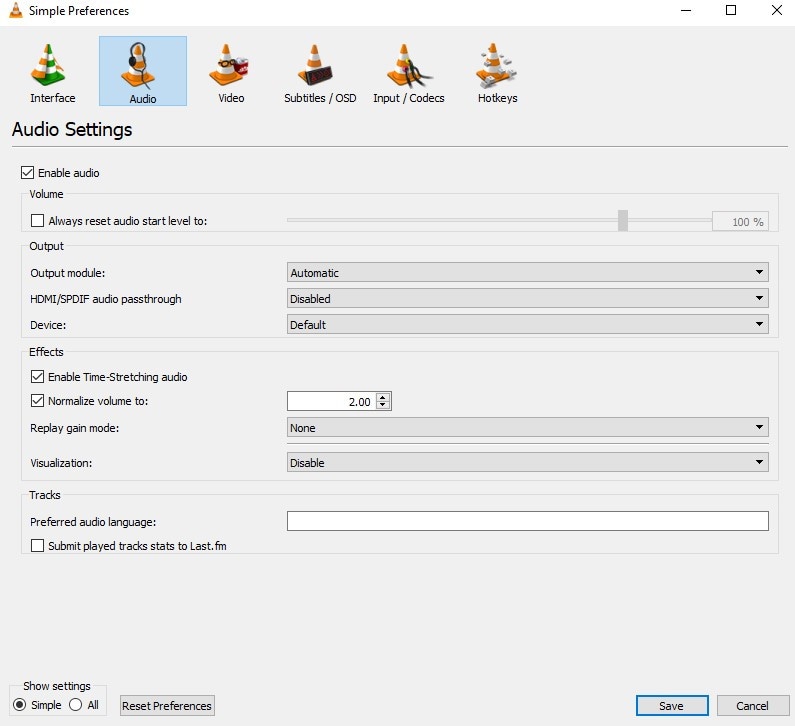
But, it might be the case that you are not so satisfied with the simple editing and want a little more to get from the editing process on VLC. So, you can do more with the Audio Effects menu there. And the steps are as follows:
First, on your VLC player, find Tools and then, in the menu, go to Preferences. The window will open, and there you need to select All in Show settings – actually it is a little bit hard to find because this is in the bottom left corner of the window. From there, you will need to navigate to Audio, and then, a little below, click on Filters and highlight it. The checkbox next to the Dynamic range compressor will probably be unchecked – so, check in it.
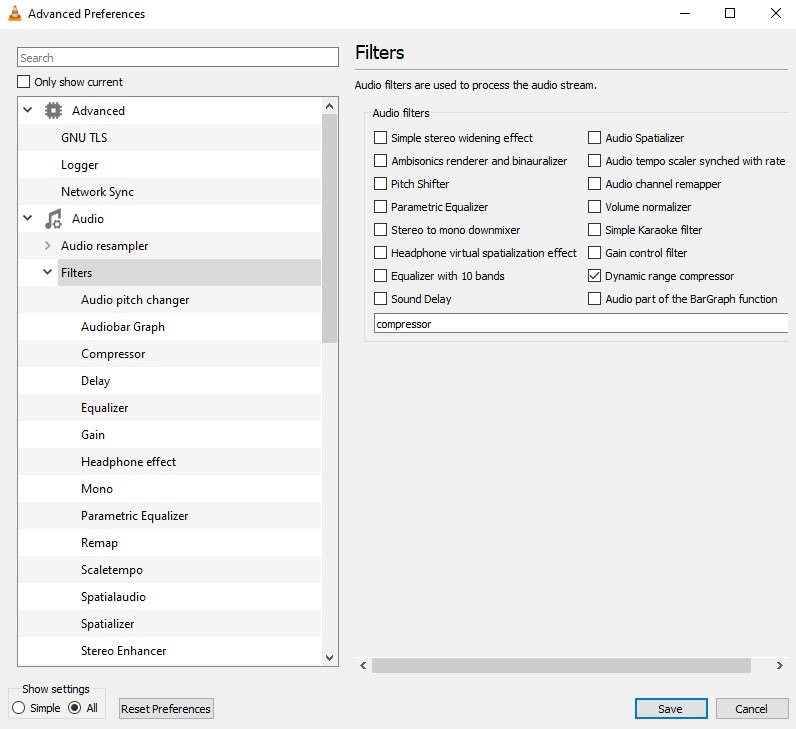
Next, see where Compressor is in the left panel? Select it. And now, you are free to make the changes to the levels as you see fit.
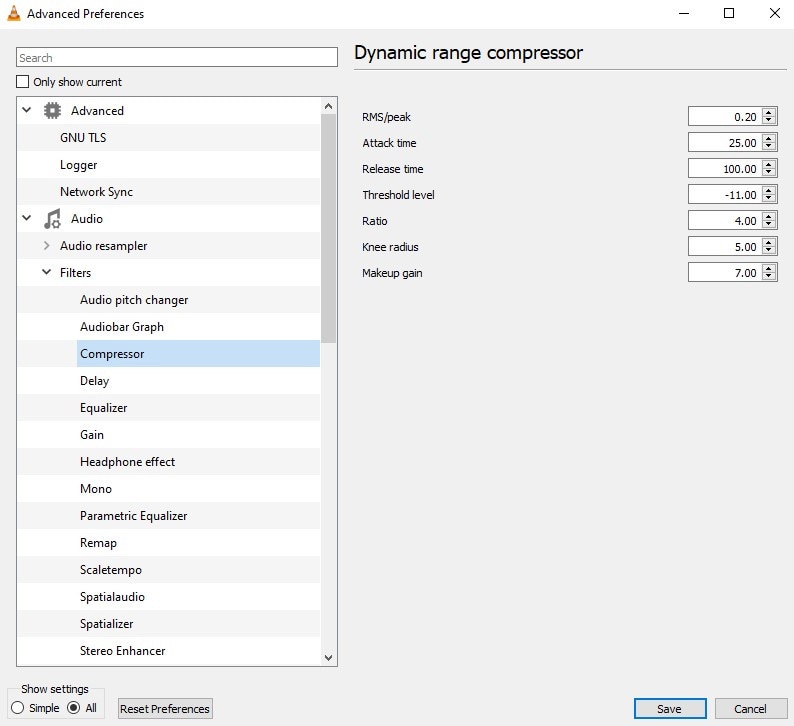
Here, if you are a little bit overwhelmed with the wide range of options to work on, you can just concentrate the most on Makeup gain, Threshold, and Ratio. The first one is by which you adjust in quiet sequences to raise the volume, the second will help you reduce louder sequences to even things out, and ratio is the maximum level of all audio within a movie, let’s say.
Don’t underestimate Attack time and release time, either. They graduate the changes to ramp them up at first, then down again, rather than initiating them immediately. So, if you set them to your liking as well, this will ensure that you have a more fluid transition in and out of the scene and there are less sudden, sometimes scary volume changes.
Therefore, you are now equipped with the most information you will need to normalize volume in VLC Player – so free to give it a go, play around with the different settings and carry out the best result imaginable for you!
How to normalize audio in Wondershare Filmora?
Now, even though we already know how to normalize audio in VLC in the simplest, as well as in the more advanced way, it might be even better if we know some more about normalizing audios in different programs. Something worth discussing is a software called Wondershare Filmora , which carries out the same task wonderfully. Although, unlike VLC Media Player, it is a real video editor , but don’t panic if you have never laid your hand on editing – it is one of the easiest to use ini the word, operating also both on Mac and Windows, and its interface is utterly understandable for beginners right away. And, actually, it is a qhile that Wondershare Filmora X introduced the feature to normalize the audio for the first time. What to say more - you might want to stop now and download the latest version of Filmora because now we are about to learn how to normalize audio from the video there – so, tune in!
Free Download For Win 7 or later(64-bit)
Free Download For macOS 10.14 or later
When it is done installing, open the software. Now, click and drag the video of which the audio you want to normalize. Now you can select the clip you have chosen – if there are multiple, select all of them, then right-click and choose Detach Audio.
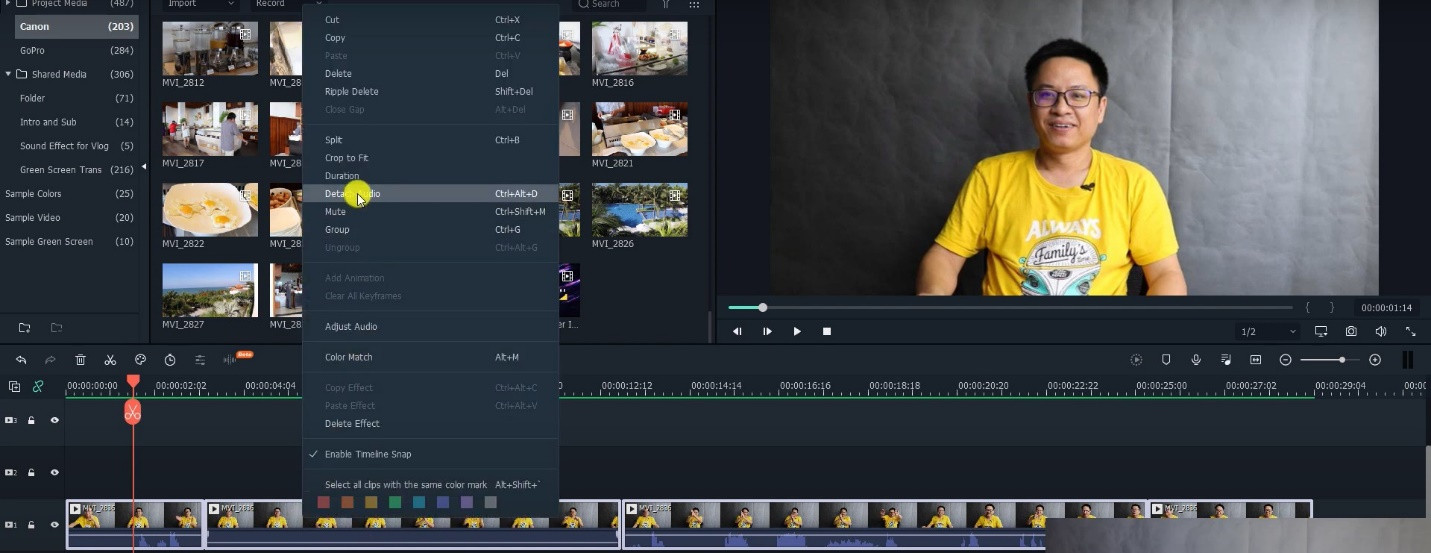
Now if you have this kind of graphic before your eyes, you can be pretty sure without even listening, that the noises are really, really different from each other, which highlights once again how useful audio normalization can be:

Select these files, right-click and choose Adjust Audio. New panel will be opened on left top and there, you will see Audio Normalization – check the box there.
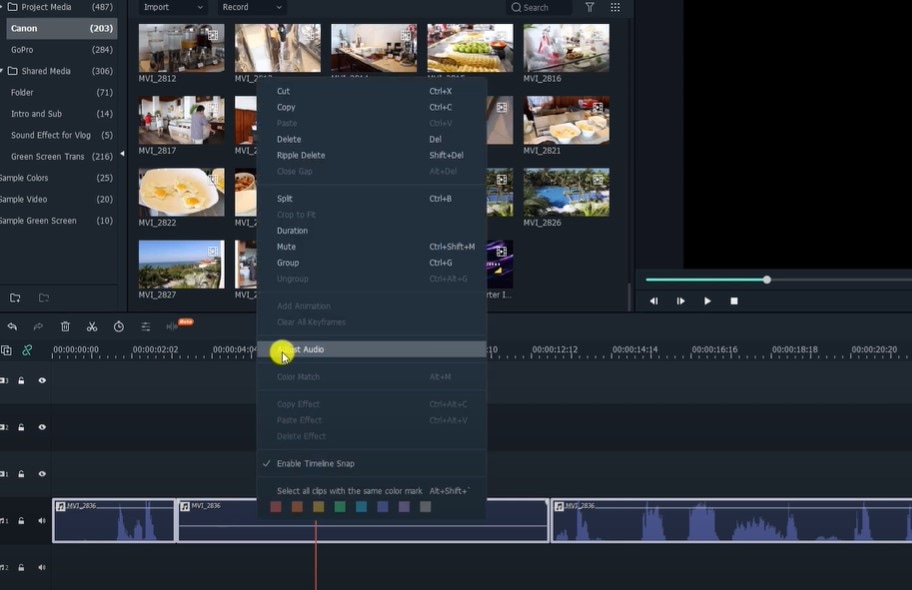
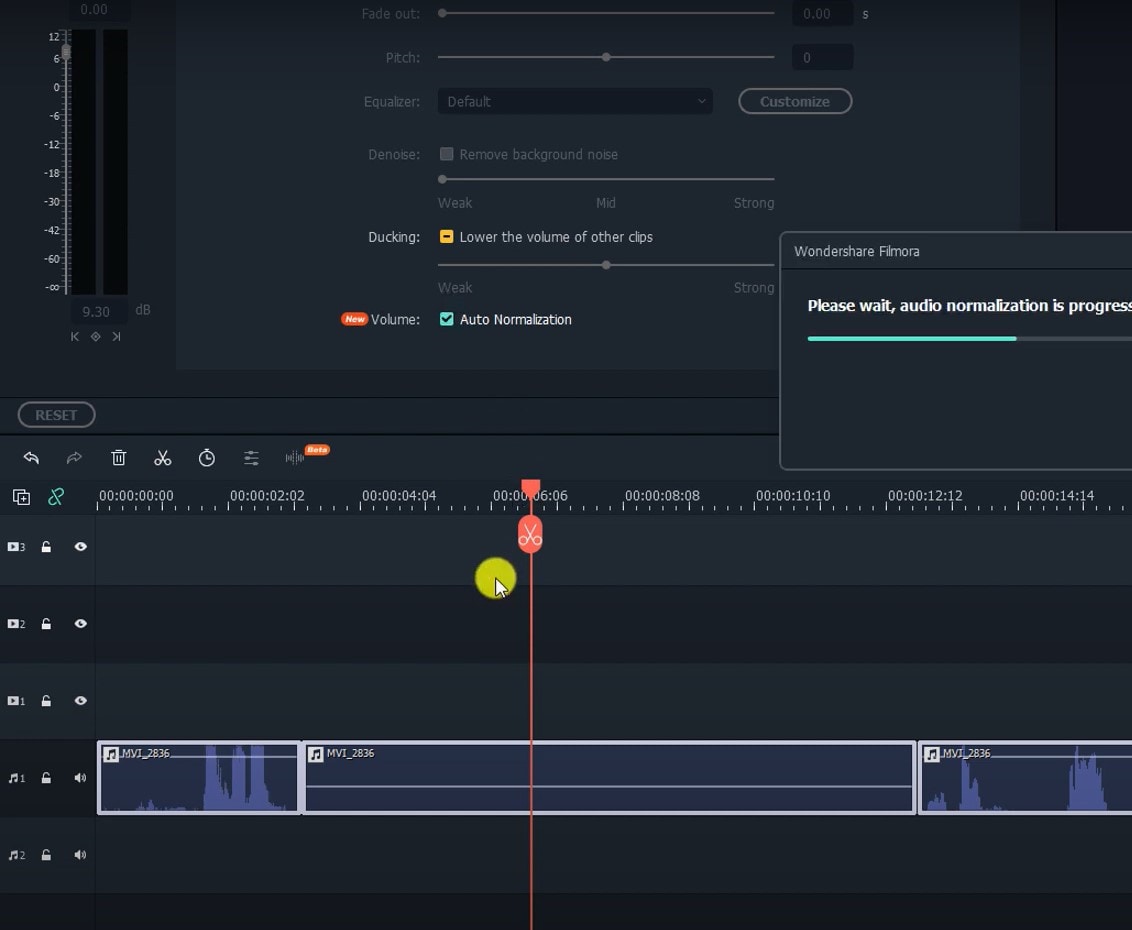
After you have clicked on it, wait until the normalization completes.

Soon, all audio will be normalized, and you will already be able to see on the graphics that the volumes are almost on the same level and when you listen to it, you will make sure that there is no longer apparent difference between how they sound. And from there on, you can save the file you just normalized!
So, in this article, we learned a lot about normalizing volumes, why and how it is done, and, more specifically, how to get this task completed in VLC Media Player as well as in Wondershare Filmora X. you can proceed to putting this new information into a good use and come back to learn more about video and audio editing here!
Free Download For macOS 10.14 or later
When it is done installing, open the software. Now, click and drag the video of which the audio you want to normalize. Now you can select the clip you have chosen – if there are multiple, select all of them, then right-click and choose Detach Audio.

Now if you have this kind of graphic before your eyes, you can be pretty sure without even listening, that the noises are really, really different from each other, which highlights once again how useful audio normalization can be:

Select these files, right-click and choose Adjust Audio. New panel will be opened on left top and there, you will see Audio Normalization – check the box there.


After you have clicked on it, wait until the normalization completes.

Soon, all audio will be normalized, and you will already be able to see on the graphics that the volumes are almost on the same level and when you listen to it, you will make sure that there is no longer apparent difference between how they sound. And from there on, you can save the file you just normalized!
So, in this article, we learned a lot about normalizing volumes, why and how it is done, and, more specifically, how to get this task completed in VLC Media Player as well as in Wondershare Filmora X. you can proceed to putting this new information into a good use and come back to learn more about video and audio editing here!
“Sonic Separation: Isolating Key Audio Elements and Silencing the Bystander in DaVinci Resolve”
Adobe Premiere Pro is a video editing tool. In the editing world, Premiere Pro has a separate fan base; people use this video editing tool because of its unmatchable features. People love the quality of editing that Premiere Pro delivers. Among its many features, few are color correction, safe margins, rulers, and audio assign.
Moreover, the video editor has an Auto Reframe feature. Along with this, Premiere Pro offers Comparison View and many other things. If you want to learn more about Premiere Pro and how to remove noise from video in Premiere Pro, then stay with us.
In this article
01 Remove Background Noise Premiere Pro
02 How to Mute A Clip in Premiere Pro
03 Tips and Tricks to Help You Better Editing Audio in Premiere Pro
Part 1. Remove Background Noise Premiere Pro
While recording a video, you cannot control every noise. Sometimes, you get disturbed by your doorbell. Sometimes, it’s your neighbor’s horn that might bother you or anything else. What do you do when this happens to you? Do you stop the recording and wait until it’s quiet?
If this is what you do, then let us share a smart solution with you. Background noise can be removed from your video using the remove background noise Premiere Pro feature. Allow us to share its steps to guide you more about it.
Step 1: Import the File
To remove background noise from your videos, you first need to import the media file to Premiere Pro. Then drag and drop the file onto the timeline. After that, you need to select and open the ‘Effects’ menu.
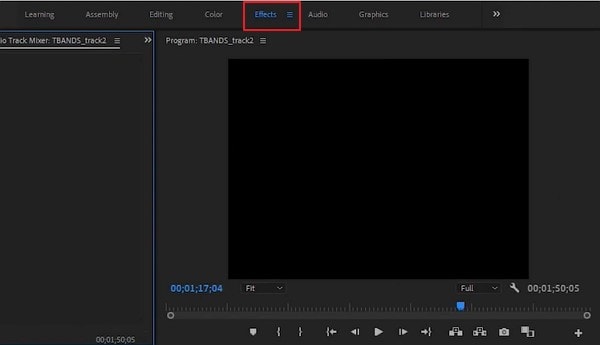
Step 2: Add Denoise Effect
On the right side of the Effects menu, type and search for ‘Denoise.’ Then, you should select the Denoise option and drag it onto the timeline over the media file. The Denoise feature removes nearly 50% of the noise automatically.
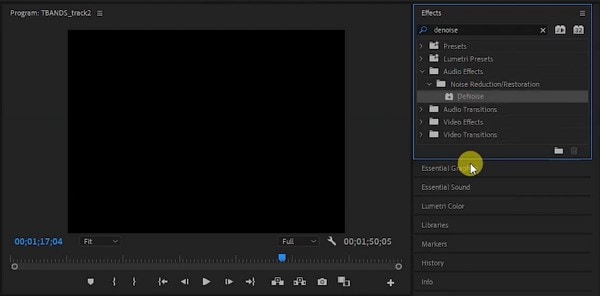
Step 3: Denoise Effects Control
The rest of the background noise can be customized. For that, head to the ‘Effects Control’ section. You will see Denoise-related options. There, click on ‘Edit’ for Custom Setup. You can adjust both the ‘Frequency’ and ‘Amount’ values.
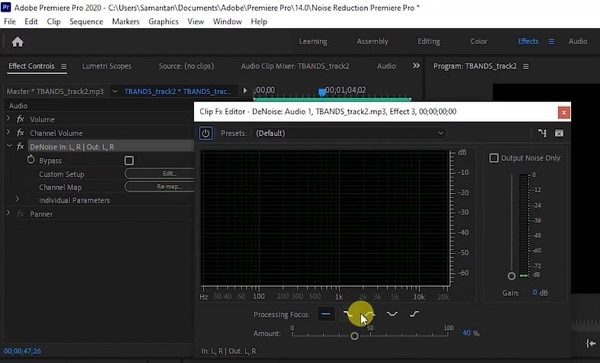
Step 4: Voice Enhance Effect
Removing background noise damages the quality of voice. This quality can be improved by using ‘Vocal Enhance.’ You can search it from the search bar in the Effects tab and drag it over to the media file in the timeline. You can also customize this from the ‘Effects Control’ tab.
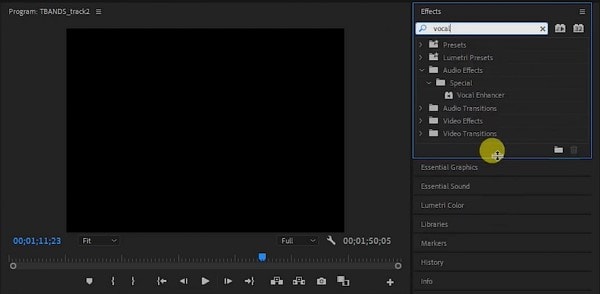
Part 2. How to Mute A Clip in Premiere Pro
Sometimes, you might need to mute a clip. You can use such clips as your status. You can also add your desired background music and then share the clips. In any case, you need to mute the clip, but what if you don’t know how to mute the clip in Premiere Pro?
Don’t worry because we are here to help you. The following section of this article will share different methods to mute clips in Adobe Premiere Pro.
Method 1: The first method is to mute an entire clip on the timeline. This could be done by checking the Mute Track ‘M’ button. You will find the mute button beside the track name.
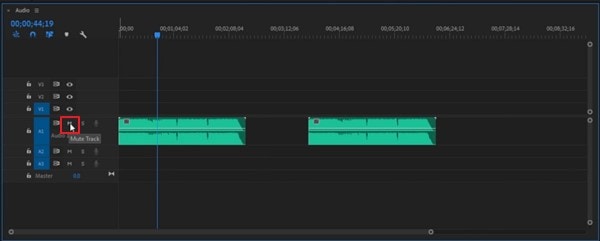
Method 2: The next method is to mute a specific clip. For that, go to the ‘Audio’ section from the menu bar. Then, look at the ‘Essential Sound’ panel on the right side of the screen. From you will see various tags. Open your desired tag and check the box against the ‘Mute’ option.
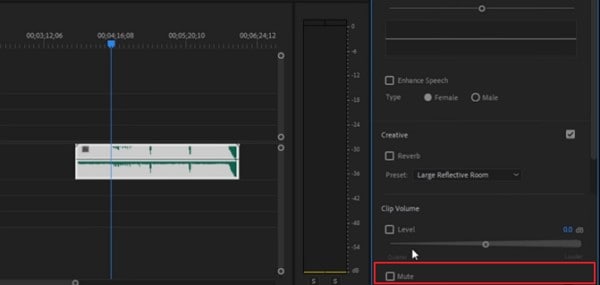
Method 3: Another method that could be used to mute a clip is by right-clicking on the clip that you want to mute. A menu appears on the screen. From that menu, you need to uncheck the ‘Enable’ button. This mutes the clip.
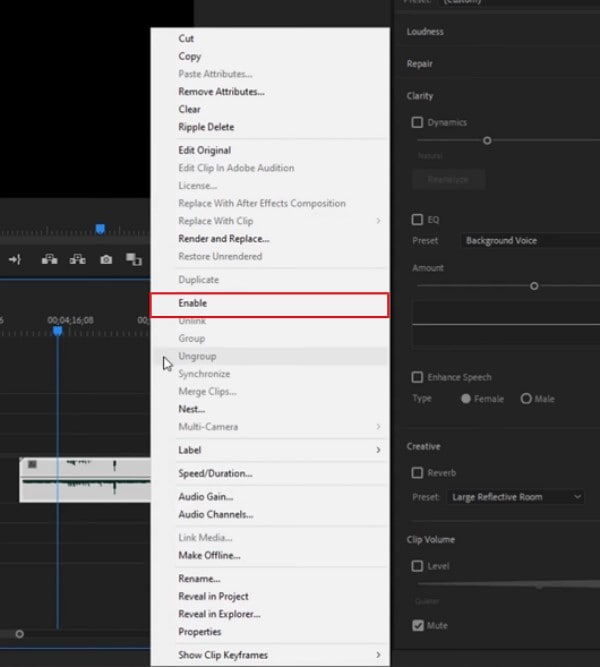
Method 4: The next method demands you to first select the video clip. Then, from the menu bar, head over to the ‘Editing’ tab. There go to the ‘Audio Clip Mixer’ section. You will see volume sliders; drag down the Volume slider to negative to mute the clip.
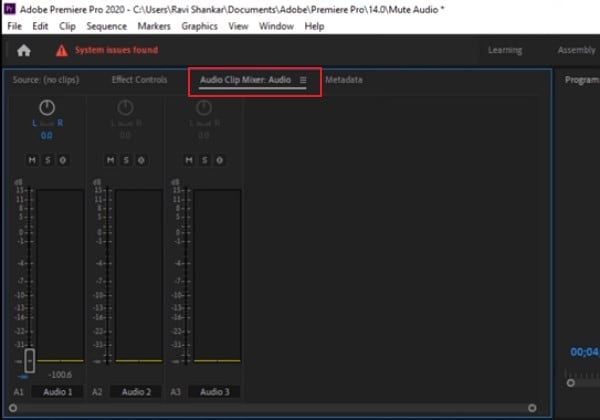
Part 3. Tips and Tricks to Help You Better Editing Audio in Premiere Pro
As we have mentioned earlier, noise removal damages the overall quality of the audio. All your effort goes to waste if your voice is not clear or anything else. Now that you know how you can handle background noise removal, it’s time to talk about something new and different.
The following section of this article is going to share tips and tricks that could be adopted. These will help you to get better and improved quality while editing audio.
1. Restore Bass
The first tip that we are going to introduce is restoring the bass of the media file. You can do this by using the Parametric Equalizer and dragging it onto the timeline. With an equalizer, you can play with different audio frequencies. Whatsoever suits the best, you can set it.
2. Atmosphere Setting
Its essential to first of all create an atmosphere. For this, you can mix sounds, add reverb and even adjust the loudness. An ambiance audio tag can be used for background noise. You need to set the scene for your music or the dialogue.
3. Compress the Audio
To make the audio better and more consistent, it is essential to compress it. Like the name is presenting, compression lowers the volume of loud parts, increases the volume of fairly quiet parts, it compresses the waveform of audio. After compression, your audio sounds instantly better, especially the voices.
4. Dialogue Adjustments
You can unify different recordings for a common loudness if you tag audio clips as Dialogue. If you plan to add a voiceover to your video, then you must improve the clarity, reduce or remove any background noise and also, adjust the reverb. Subtitles could be added to make the conversation understandable in your video.
5. Remove Noise
The noise of the computer fan or the weird hissing noise of the microphone and other similar things are referred to as Background noise. This can become a distracting element. While editing the audio, it matters that you remove the background noise because it does not get automatically removed. So, to have good audio, always remove background noise.
Bottom Line
If background noise is bothering you, then this problem is resolved. The article above has shared how to remove noise from video in premiere pro. The easy step-by-step guide for removing background noise with Premiere Pro has been shared.
To remove background noise, Premiere Pro is not the only editor. Wondershare Filmora is another stunning and known video editor. You can use the tool to remove background noise from your videos. With this editor, you can also mute your clips.
Not just this, but the editor has many more classic features. Filmora allows keyframing, motion tracking, and doing cool edits with a split-screen. Color match is another offered feature among the many other features of Filmora. It also has an asset library. You can get fantastic effects, transitions, elements, and whatnot from its library.
For Win 7 or later (64-bit)
For macOS 10.12 or later
02 How to Mute A Clip in Premiere Pro
03 Tips and Tricks to Help You Better Editing Audio in Premiere Pro
Part 1. Remove Background Noise Premiere Pro
While recording a video, you cannot control every noise. Sometimes, you get disturbed by your doorbell. Sometimes, it’s your neighbor’s horn that might bother you or anything else. What do you do when this happens to you? Do you stop the recording and wait until it’s quiet?
If this is what you do, then let us share a smart solution with you. Background noise can be removed from your video using the remove background noise Premiere Pro feature. Allow us to share its steps to guide you more about it.
Step 1: Import the File
To remove background noise from your videos, you first need to import the media file to Premiere Pro. Then drag and drop the file onto the timeline. After that, you need to select and open the ‘Effects’ menu.

Step 2: Add Denoise Effect
On the right side of the Effects menu, type and search for ‘Denoise.’ Then, you should select the Denoise option and drag it onto the timeline over the media file. The Denoise feature removes nearly 50% of the noise automatically.

Step 3: Denoise Effects Control
The rest of the background noise can be customized. For that, head to the ‘Effects Control’ section. You will see Denoise-related options. There, click on ‘Edit’ for Custom Setup. You can adjust both the ‘Frequency’ and ‘Amount’ values.

Step 4: Voice Enhance Effect
Removing background noise damages the quality of voice. This quality can be improved by using ‘Vocal Enhance.’ You can search it from the search bar in the Effects tab and drag it over to the media file in the timeline. You can also customize this from the ‘Effects Control’ tab.

Part 2. How to Mute A Clip in Premiere Pro
Sometimes, you might need to mute a clip. You can use such clips as your status. You can also add your desired background music and then share the clips. In any case, you need to mute the clip, but what if you don’t know how to mute the clip in Premiere Pro?
Don’t worry because we are here to help you. The following section of this article will share different methods to mute clips in Adobe Premiere Pro.
Method 1: The first method is to mute an entire clip on the timeline. This could be done by checking the Mute Track ‘M’ button. You will find the mute button beside the track name.

Method 2: The next method is to mute a specific clip. For that, go to the ‘Audio’ section from the menu bar. Then, look at the ‘Essential Sound’ panel on the right side of the screen. From you will see various tags. Open your desired tag and check the box against the ‘Mute’ option.

Method 3: Another method that could be used to mute a clip is by right-clicking on the clip that you want to mute. A menu appears on the screen. From that menu, you need to uncheck the ‘Enable’ button. This mutes the clip.

Method 4: The next method demands you to first select the video clip. Then, from the menu bar, head over to the ‘Editing’ tab. There go to the ‘Audio Clip Mixer’ section. You will see volume sliders; drag down the Volume slider to negative to mute the clip.

Part 3. Tips and Tricks to Help You Better Editing Audio in Premiere Pro
As we have mentioned earlier, noise removal damages the overall quality of the audio. All your effort goes to waste if your voice is not clear or anything else. Now that you know how you can handle background noise removal, it’s time to talk about something new and different.
The following section of this article is going to share tips and tricks that could be adopted. These will help you to get better and improved quality while editing audio.
1. Restore Bass
The first tip that we are going to introduce is restoring the bass of the media file. You can do this by using the Parametric Equalizer and dragging it onto the timeline. With an equalizer, you can play with different audio frequencies. Whatsoever suits the best, you can set it.
2. Atmosphere Setting
Its essential to first of all create an atmosphere. For this, you can mix sounds, add reverb and even adjust the loudness. An ambiance audio tag can be used for background noise. You need to set the scene for your music or the dialogue.
3. Compress the Audio
To make the audio better and more consistent, it is essential to compress it. Like the name is presenting, compression lowers the volume of loud parts, increases the volume of fairly quiet parts, it compresses the waveform of audio. After compression, your audio sounds instantly better, especially the voices.
4. Dialogue Adjustments
You can unify different recordings for a common loudness if you tag audio clips as Dialogue. If you plan to add a voiceover to your video, then you must improve the clarity, reduce or remove any background noise and also, adjust the reverb. Subtitles could be added to make the conversation understandable in your video.
5. Remove Noise
The noise of the computer fan or the weird hissing noise of the microphone and other similar things are referred to as Background noise. This can become a distracting element. While editing the audio, it matters that you remove the background noise because it does not get automatically removed. So, to have good audio, always remove background noise.
Bottom Line
If background noise is bothering you, then this problem is resolved. The article above has shared how to remove noise from video in premiere pro. The easy step-by-step guide for removing background noise with Premiere Pro has been shared.
To remove background noise, Premiere Pro is not the only editor. Wondershare Filmora is another stunning and known video editor. You can use the tool to remove background noise from your videos. With this editor, you can also mute your clips.
Not just this, but the editor has many more classic features. Filmora allows keyframing, motion tracking, and doing cool edits with a split-screen. Color match is another offered feature among the many other features of Filmora. It also has an asset library. You can get fantastic effects, transitions, elements, and whatnot from its library.
For Win 7 or later (64-bit)
For macOS 10.12 or later
02 How to Mute A Clip in Premiere Pro
03 Tips and Tricks to Help You Better Editing Audio in Premiere Pro
Part 1. Remove Background Noise Premiere Pro
While recording a video, you cannot control every noise. Sometimes, you get disturbed by your doorbell. Sometimes, it’s your neighbor’s horn that might bother you or anything else. What do you do when this happens to you? Do you stop the recording and wait until it’s quiet?
If this is what you do, then let us share a smart solution with you. Background noise can be removed from your video using the remove background noise Premiere Pro feature. Allow us to share its steps to guide you more about it.
Step 1: Import the File
To remove background noise from your videos, you first need to import the media file to Premiere Pro. Then drag and drop the file onto the timeline. After that, you need to select and open the ‘Effects’ menu.

Step 2: Add Denoise Effect
On the right side of the Effects menu, type and search for ‘Denoise.’ Then, you should select the Denoise option and drag it onto the timeline over the media file. The Denoise feature removes nearly 50% of the noise automatically.

Step 3: Denoise Effects Control
The rest of the background noise can be customized. For that, head to the ‘Effects Control’ section. You will see Denoise-related options. There, click on ‘Edit’ for Custom Setup. You can adjust both the ‘Frequency’ and ‘Amount’ values.

Step 4: Voice Enhance Effect
Removing background noise damages the quality of voice. This quality can be improved by using ‘Vocal Enhance.’ You can search it from the search bar in the Effects tab and drag it over to the media file in the timeline. You can also customize this from the ‘Effects Control’ tab.

Part 2. How to Mute A Clip in Premiere Pro
Sometimes, you might need to mute a clip. You can use such clips as your status. You can also add your desired background music and then share the clips. In any case, you need to mute the clip, but what if you don’t know how to mute the clip in Premiere Pro?
Don’t worry because we are here to help you. The following section of this article will share different methods to mute clips in Adobe Premiere Pro.
Method 1: The first method is to mute an entire clip on the timeline. This could be done by checking the Mute Track ‘M’ button. You will find the mute button beside the track name.

Method 2: The next method is to mute a specific clip. For that, go to the ‘Audio’ section from the menu bar. Then, look at the ‘Essential Sound’ panel on the right side of the screen. From you will see various tags. Open your desired tag and check the box against the ‘Mute’ option.

Method 3: Another method that could be used to mute a clip is by right-clicking on the clip that you want to mute. A menu appears on the screen. From that menu, you need to uncheck the ‘Enable’ button. This mutes the clip.

Method 4: The next method demands you to first select the video clip. Then, from the menu bar, head over to the ‘Editing’ tab. There go to the ‘Audio Clip Mixer’ section. You will see volume sliders; drag down the Volume slider to negative to mute the clip.

Part 3. Tips and Tricks to Help You Better Editing Audio in Premiere Pro
As we have mentioned earlier, noise removal damages the overall quality of the audio. All your effort goes to waste if your voice is not clear or anything else. Now that you know how you can handle background noise removal, it’s time to talk about something new and different.
The following section of this article is going to share tips and tricks that could be adopted. These will help you to get better and improved quality while editing audio.
1. Restore Bass
The first tip that we are going to introduce is restoring the bass of the media file. You can do this by using the Parametric Equalizer and dragging it onto the timeline. With an equalizer, you can play with different audio frequencies. Whatsoever suits the best, you can set it.
2. Atmosphere Setting
Its essential to first of all create an atmosphere. For this, you can mix sounds, add reverb and even adjust the loudness. An ambiance audio tag can be used for background noise. You need to set the scene for your music or the dialogue.
3. Compress the Audio
To make the audio better and more consistent, it is essential to compress it. Like the name is presenting, compression lowers the volume of loud parts, increases the volume of fairly quiet parts, it compresses the waveform of audio. After compression, your audio sounds instantly better, especially the voices.
4. Dialogue Adjustments
You can unify different recordings for a common loudness if you tag audio clips as Dialogue. If you plan to add a voiceover to your video, then you must improve the clarity, reduce or remove any background noise and also, adjust the reverb. Subtitles could be added to make the conversation understandable in your video.
5. Remove Noise
The noise of the computer fan or the weird hissing noise of the microphone and other similar things are referred to as Background noise. This can become a distracting element. While editing the audio, it matters that you remove the background noise because it does not get automatically removed. So, to have good audio, always remove background noise.
Bottom Line
If background noise is bothering you, then this problem is resolved. The article above has shared how to remove noise from video in premiere pro. The easy step-by-step guide for removing background noise with Premiere Pro has been shared.
To remove background noise, Premiere Pro is not the only editor. Wondershare Filmora is another stunning and known video editor. You can use the tool to remove background noise from your videos. With this editor, you can also mute your clips.
Not just this, but the editor has many more classic features. Filmora allows keyframing, motion tracking, and doing cool edits with a split-screen. Color match is another offered feature among the many other features of Filmora. It also has an asset library. You can get fantastic effects, transitions, elements, and whatnot from its library.
For Win 7 or later (64-bit)
For macOS 10.12 or later
02 How to Mute A Clip in Premiere Pro
03 Tips and Tricks to Help You Better Editing Audio in Premiere Pro
Part 1. Remove Background Noise Premiere Pro
While recording a video, you cannot control every noise. Sometimes, you get disturbed by your doorbell. Sometimes, it’s your neighbor’s horn that might bother you or anything else. What do you do when this happens to you? Do you stop the recording and wait until it’s quiet?
If this is what you do, then let us share a smart solution with you. Background noise can be removed from your video using the remove background noise Premiere Pro feature. Allow us to share its steps to guide you more about it.
Step 1: Import the File
To remove background noise from your videos, you first need to import the media file to Premiere Pro. Then drag and drop the file onto the timeline. After that, you need to select and open the ‘Effects’ menu.

Step 2: Add Denoise Effect
On the right side of the Effects menu, type and search for ‘Denoise.’ Then, you should select the Denoise option and drag it onto the timeline over the media file. The Denoise feature removes nearly 50% of the noise automatically.

Step 3: Denoise Effects Control
The rest of the background noise can be customized. For that, head to the ‘Effects Control’ section. You will see Denoise-related options. There, click on ‘Edit’ for Custom Setup. You can adjust both the ‘Frequency’ and ‘Amount’ values.

Step 4: Voice Enhance Effect
Removing background noise damages the quality of voice. This quality can be improved by using ‘Vocal Enhance.’ You can search it from the search bar in the Effects tab and drag it over to the media file in the timeline. You can also customize this from the ‘Effects Control’ tab.

Part 2. How to Mute A Clip in Premiere Pro
Sometimes, you might need to mute a clip. You can use such clips as your status. You can also add your desired background music and then share the clips. In any case, you need to mute the clip, but what if you don’t know how to mute the clip in Premiere Pro?
Don’t worry because we are here to help you. The following section of this article will share different methods to mute clips in Adobe Premiere Pro.
Method 1: The first method is to mute an entire clip on the timeline. This could be done by checking the Mute Track ‘M’ button. You will find the mute button beside the track name.

Method 2: The next method is to mute a specific clip. For that, go to the ‘Audio’ section from the menu bar. Then, look at the ‘Essential Sound’ panel on the right side of the screen. From you will see various tags. Open your desired tag and check the box against the ‘Mute’ option.

Method 3: Another method that could be used to mute a clip is by right-clicking on the clip that you want to mute. A menu appears on the screen. From that menu, you need to uncheck the ‘Enable’ button. This mutes the clip.

Method 4: The next method demands you to first select the video clip. Then, from the menu bar, head over to the ‘Editing’ tab. There go to the ‘Audio Clip Mixer’ section. You will see volume sliders; drag down the Volume slider to negative to mute the clip.

Part 3. Tips and Tricks to Help You Better Editing Audio in Premiere Pro
As we have mentioned earlier, noise removal damages the overall quality of the audio. All your effort goes to waste if your voice is not clear or anything else. Now that you know how you can handle background noise removal, it’s time to talk about something new and different.
The following section of this article is going to share tips and tricks that could be adopted. These will help you to get better and improved quality while editing audio.
1. Restore Bass
The first tip that we are going to introduce is restoring the bass of the media file. You can do this by using the Parametric Equalizer and dragging it onto the timeline. With an equalizer, you can play with different audio frequencies. Whatsoever suits the best, you can set it.
2. Atmosphere Setting
Its essential to first of all create an atmosphere. For this, you can mix sounds, add reverb and even adjust the loudness. An ambiance audio tag can be used for background noise. You need to set the scene for your music or the dialogue.
3. Compress the Audio
To make the audio better and more consistent, it is essential to compress it. Like the name is presenting, compression lowers the volume of loud parts, increases the volume of fairly quiet parts, it compresses the waveform of audio. After compression, your audio sounds instantly better, especially the voices.
4. Dialogue Adjustments
You can unify different recordings for a common loudness if you tag audio clips as Dialogue. If you plan to add a voiceover to your video, then you must improve the clarity, reduce or remove any background noise and also, adjust the reverb. Subtitles could be added to make the conversation understandable in your video.
5. Remove Noise
The noise of the computer fan or the weird hissing noise of the microphone and other similar things are referred to as Background noise. This can become a distracting element. While editing the audio, it matters that you remove the background noise because it does not get automatically removed. So, to have good audio, always remove background noise.
Bottom Line
If background noise is bothering you, then this problem is resolved. The article above has shared how to remove noise from video in premiere pro. The easy step-by-step guide for removing background noise with Premiere Pro has been shared.
To remove background noise, Premiere Pro is not the only editor. Wondershare Filmora is another stunning and known video editor. You can use the tool to remove background noise from your videos. With this editor, you can also mute your clips.
Not just this, but the editor has many more classic features. Filmora allows keyframing, motion tracking, and doing cool edits with a split-screen. Color match is another offered feature among the many other features of Filmora. It also has an asset library. You can get fantastic effects, transitions, elements, and whatnot from its library.
For Win 7 or later (64-bit)
For macOS 10.12 or later
Also read:
- 2024 Approved Hunt for Amusing Sound Layers and Tones
- New In 2024, AIFF to MP3 An Experts Methodology for Audio Conversion
- Updated In 2024, Sonic Injury A Compilation of Terrifying Noise Samples for Entertainment
- New In 2024, The Engineers Selection Identifying the Best 5 Dynamic Ducking Software Updates (2 Market Trends)
- New Experts Selection The Premier MP3 Snipper Software for Mac Devices, Updated for 2024
- In 2024, Unlocking Free Speech-to-Text Services A Selection of Top Apps for Audio Transcription, 2023 Edition
- Updated Unveiling the 6 Finest Automatic Transcription Applications for 2024
- Top 10 Audio Editing Apps Beyond Audacity
- New In 2024, Whisper Through Winds Secrets for Neutralizing Wind Noise in Digital Soundscapes
- Updated 2024 Approved Where to Locate High-Quality Recorded Bird Calls on the Web
- In 2024, Creative and Catchy Ringtone Selections for Modern Phones
- New Aggregated List of Venues for Podcast Broadcasting and Distribution
- Enhancing Mobile Audio Clarity Ranking the Best Apps to Improve iPhone & Android Sound
- Updated Top 10 Digital Audio Workstation Tools Free vs Paid Options
- Comprehensive Guide to the Wave Editor Highlights, Critiques, and Walkthroughs
- In 2024, From Silence to Symphony Incorporating Music Into Animated Graphics on macOS
- New In 2024, Advanced 10 Software Suites for Males Aiming at Female-Like Voices Transforming Tones with Power
- In 2024, Mastering Soundscapes Best Background Noise Cancellers
- Updated The Ultimate Compilation of Best No-Price-Tag Podcast Recording Programs for 2024
- The Ultimate List 6 Must-Have Voice Amplification Tools for Mobile Phones
- New 2024 Approved Expert Recommendations Where to Find Pure Environmental Noise
- Updated In 2024, Premier Audio File Transformer Effortless MP3 Creation in Seconds
- 2024 Approved From Sight to Sound Modern Methods for Pulling Audio From Visual Media
- New 2024 Approved Enhancing Videos with Voiceover Modern Techniques
- The Ultimate List Best Voice-Silencing Apps for Professional Karaoke & Studio Environments for 2024
- Updated 2024 Approved Audio-Visual Synergy Incorporate Free Soundtracks Into Photos
- MP3 Cutter for Mac - Which Is the Best MP3 Cutter on Mac for 2024
- New In 2024, Mastering Tempo Adjustments Aligning Audio and Visuals in FCPX
- Updated From Sound to Screen Revolutionary Ways to Auto-Synchronize in the Age of Digital Media Production for 2024
- In 2024, Discover 4 Expertly Crafted Web Tools to Amplify Your Audio in Videos
- New Identify the Tone Generated by Stroke-Based Audio Design for 2024
- New Fast-Track MP3 Splitting A Convenient Guide to Rapidly Dividing Audio Files for 2024
- Updated Exploring Top-Rated Podcast Hosting Solutions
- Updated 2024 Approved Silencing Soundscape Guiding You to Audio Deletion in MOV Files for Both Operating Systems
- Step-by-Step An Essential Tutorial on Editing Your First Podcast
- 2024 Approved Quest for Humorous Auditory Patterns
- Updated In 2024, Discover the Leading Free Audio Modification Software of the Year
- Updated 2024 Approved Uncovering Fragmentation Auditory Signal
- In 2024, The Ultimate MP3 Editors Manual Techniques for Optimal Sound Quality
- How to Mirror Apple iPhone 14 Pro Max to iPad? | Dr.fone
- In 2024, How To Unlock Stolen Apple iPhone 14 Pro In Different Conditionsin
- How to Unlock Your iPhone 14 Pro Max Passcode 4 Easy Methods (With or Without iTunes) | Dr.fone
- In 2024, Where Is the Best Place to Catch Dratini On Google Pixel Fold | Dr.fone
- How To Unlock Any Samsung Galaxy A14 4G Phone Password Using Emergency Call
- Looking For A Location Changer On Tecno Pova 6 Pro 5G? Look No Further | Dr.fone
- In 2024, Dose Life360 Notify Me When Someone Checks My Location On Realme C55? | Dr.fone
- new In 2024, A Comprehensive Guide for Free Video Translator Downloading
- Why Your Vivo S17e Screen Might be Unresponsive and How to Fix It | Dr.fone
- Easy Ways to Manage Your Meizu 21 Pro Location Settings | Dr.fone
- 2024 Approved Swap Windows for Mac Best Video Editing Software Alternatives to Movie Maker
- In 2024, The Best Methods to Unlock the iPhone Locked to Owner for Apple iPhone 8 Plus
- Ultimate Guide to Catch the Regional-Located Pokemon For Motorola Edge 40 | Dr.fone
- Realme Note 50 Not Connecting to Wi-Fi? 12 Quick Ways to Fix | Dr.fone
- In 2024, The Ultimate Guide to Get the Rare Candy on Pokemon Go Fire Red On Tecno Spark 10 5G | Dr.fone
- In 2024, 10 Easy-to-Use FRP Bypass Tools for Unlocking Google Accounts On Itel P55
- Here Are Some Reliable Ways to Get Pokemon Go Friend Codes For Asus ROG Phone 7 Ultimate | Dr.fone
- In 2024, How to Change your Vivo T2 5G Location on Twitter | Dr.fone
- In 2024, How To Unlock Vivo V29 Phone Without Password?
- How to Transfer Photos From Motorola Moto G73 5G to Samsung Galaxy S21 Ultra | Dr.fone
- 3 Easy Solutions to Hard Reset Vivo X Flip | Dr.fone
- In 2024, The Complete Guide to Honor 90 FRP Bypass Everything You Need to Know
- Updated In 2024, Create Stunning Videos From Images with These 10 Online Converters
- Your Complete Guide To Reset Xiaomi Redmi K70 | Dr.fone
- How to Fix Vivo S17 Find My Friends No Location Found? | Dr.fone
- In 2024, How to Mirror Your Honor Play 40C Screen to PC with Chromecast | Dr.fone
- Ultimate Guide to Free PPTP VPN For Beginners On Nokia C22 | Dr.fone
- How to Fix Motorola Moto G Stylus (2023) Find My Friends No Location Found? | Dr.fone
- How to Share/Fake Location on WhatsApp for Tecno Pova 5 Pro | Dr.fone
- In 2024, Is Fake GPS Location Spoofer a Good Choice On Infinix Note 30 VIP Racing Edition? | Dr.fone
- In 2024, How PGSharp Save You from Ban While Spoofing Pokemon Go On Meizu 21 Pro? | Dr.fone
- In 2024, How Do You Get Sun Stone Evolutions in Pokémon For Vivo X100 Pro? | Dr.fone
- Unlock Your Device iCloud DNS Bypass Explained and Tested, Plus Easy Alternatives On iPhone 11 Pro
- Updated Open-Source Video Editing Top 10 Free Tools for 2024
- How to Fix Error 495 While Download/Updating Android Apps On Lava Agni 2 5G | Dr.fone
- Updated Morph Your Face The Best Face Swap Apps for Mobile Phones for 2024
- In 2024, 6 Proven Ways to Unlock Samsung Galaxy A54 5G Phone When You Forget the Password
- In 2024, 8 Ways to Transfer Photos from Meizu 21 to iPhone Easily | Dr.fone
- Title: In 2024, Decoding the Google Podcast App How It Transforms Your Listening Experience
- Author: David
- Created at : 2024-05-20 05:45:30
- Updated at : 2024-05-21 05:45:30
- Link: https://sound-tweaking.techidaily.com/in-2024-decoding-the-google-podcast-app-how-it-transforms-your-listening-experience/
- License: This work is licensed under CC BY-NC-SA 4.0.

